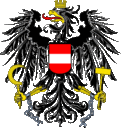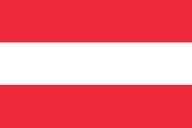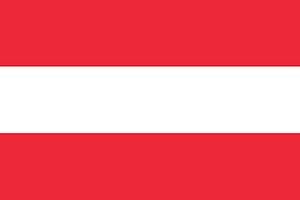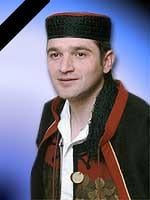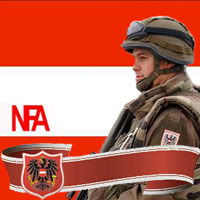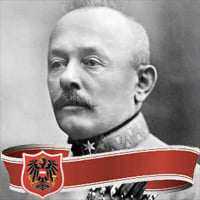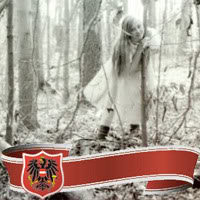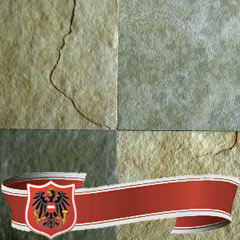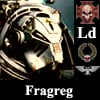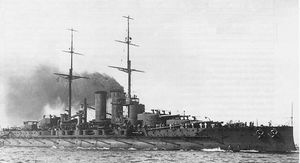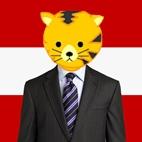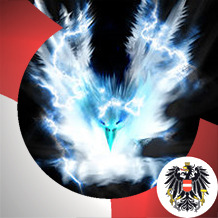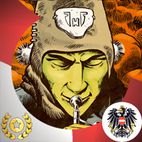Difference between revisions of "History of Austria"
m (→The Fight for Austria (May 2010)) |
|||
| (58 intermediate revisions by 4 users not shown) | |||
| Line 1: | Line 1: | ||
| − | |||
{{LangMenu}} | {{LangMenu}} | ||
| + | {{Austria Menu}} | ||
[[Austria]]'s history spans the entire course of [[eRepublik]], as one of the original nations existing since the beginning. It has experienced several distinct eras - periods of growth, decline, and rebirth - with many key players that helped to define their eras, and the nation. | [[Austria]]'s history spans the entire course of [[eRepublik]], as one of the original nations existing since the beginning. It has experienced several distinct eras - periods of growth, decline, and rebirth - with many key players that helped to define their eras, and the nation. | ||
==Early History (November 2007 - March 2009) == | ==Early History (November 2007 - March 2009) == | ||
| + | [[File:Flag-Austria.jpg|thumb|[[Austria]]'s history began with the start of [[eRepublik]].]] | ||
| + | The very earliest times in [[Austria]] remain shrouded in mystery, due to a lack of record keeping. It is suspected that the first months were very sparsely populated. No records have been found for November or December 2007, and thus the first [[List of presidents of Austria|President of Austria]] is completely unknown. | ||
| − | + | During the term of the second president, records begin to appear. Although his name is not listed, the country was reported to have 17 players, and an inactive government. The first known figure, named {{eLink|citizen|9951|frsd}} – a real life Austrian – organized opposition to the government and became the third president of Austria in February 2008. Without a newspaper, there is again little first-hand accounting of this time frame – however due to other records, the government seems to have been well run and the treasury grew. Without the war module having been implemented yet, it was by default a period of peace – with few players, yet a presence of Austrians mixed with foreigners. Among these was {{eLink|citizen|9931|VoXX}}, who would lead the party known as the Austrian Democrats. | |
| − | + | ||
| − | During the term of the second president, records begin to appear. Although his name is not listed, the country was reported to have 17 players, and an inactive government. The first known figure, named | + | |
===Growth and Conflict (March – May 2008)=== | ===Growth and Conflict (March – May 2008)=== | ||
| + | ''See also: [[Socialist Party of Austria]], [[Karantanec]], [[nejcman]], [[Nacionalna stranka Karantanije]], [[Alternative Way]]'' | ||
| − | In March 2008, | + | In March 2008, {{eLink|citizen|9931|VoXX}} was elected the fourth president (it is not clear if {{eLink|citizen|9951|frsd}} ran for re-election). The treasury continued to grow – and Austria grew closer to Sweden, a nation that was, at the time, the most powerful and populous nation (and the nation of VoXx's origin).<ref>{{eLink|article|137322|"The Country Power" - Austria Democrat News}}</ref> It was during this time that the nation began to grow, largely due to Slovenians entering Austria (as Slovenia had not been added to the New World yet).<ref>{{eLink|article|157622|"Uvodnik" Salzburske Novice}}</ref> Centering around Salzburg, they founded the Austrian Socialist Party, with {{eLink|citizen|173002|Emdvojka}} as its leader. |
| − | + | [[File:Citizen9931.jpg|thumb|{{eLink|citizen|9931|VoXX}} was the 4th [[List of presidents of Austria|President of Austria]].]] | |
With the implementation of the war module, the first conflicts of the world began – including a small clash between Slovakia and Austria – one which ended with the status quo. Meanwhile on the domestic front, the national growth set the stage for one of the first political clashes, with VoXx's incumbency matching up against the new guard in Emdvojka's [[Socialist Party of Austria]]. Arguing that it was his leadership which led to the national growth, and against the inexperience of Emdvojka, ultimately it was the new guard which would sweep to victory in April. | With the implementation of the war module, the first conflicts of the world began – including a small clash between Slovakia and Austria – one which ended with the status quo. Meanwhile on the domestic front, the national growth set the stage for one of the first political clashes, with VoXx's incumbency matching up against the new guard in Emdvojka's [[Socialist Party of Austria]]. Arguing that it was his leadership which led to the national growth, and against the inexperience of Emdvojka, ultimately it was the new guard which would sweep to victory in April. | ||
| − | Unwilling to accept the outcome, VoXx emptied the entire treasury of the nation during the closing hours of the presidential race, fleeing to | + | Unwilling to accept the outcome, VoXx emptied the entire treasury of the nation during the closing hours of the presidential race, fleeing to Sweden with a reported 1085 gold.<ref>{{eLink|article|164871|"Kurčeva kraja ali kaj za kurca?" - Salzburske Novice}}</ref> Left to pick up the pieces was the incoming president, Emdvojka. The task would prove difficult, and ultimately there were large disagreements about the best way to move forward. Opponents of the socialistic policies of the government split away, to form the [[Nacionalna stranka Karantanije]] (NSK) under the lead of [[Karantanec]], and later the [[Alternative Way]] (AW) as well, led by [[nejcman]]. |
| − | The month of April also saw a new change, with further growth in the population coming from an influx of Italian players. This would prove an issue of contention as well, with the AW and NSK wary of continued immigration, and the SPA supportive. In the May 2008 presidential race, a coalition between the AW and NSK would lead | + | The month of April also saw a new change, with further growth in the population coming from an influx of Italian players. This would prove an issue of contention as well, with the AW and NSK wary of continued immigration, and the SPA supportive. In the May 2008 presidential race, a coalition between the AW and NSK would lead nejcman to victory over the SPA. |
===Changing of the Guard (May – June 2008)=== | ===Changing of the Guard (May – June 2008)=== | ||
| + | ''See also: [[nejcman]], [[Mapplna]], [[Austrian International Movement]]'' | ||
| − | During | + | [[File:Citizen178601.jpg|thumb|left|[[nejcman]] was the 6th [[List of presidents of Austria|President of Austria]].]] |
| + | During nejcman's term, hospitals were purchased for several cities, which at the time were essential towards restoring health and at forming a more effective fighting force. The number of Italian players continued to grow, finally forming a party of their own: the [[Austrian International Movement]], led by [[Mapplna]]. Giving a direct voice to the Italian population, the center-left party formed a natural alliance with the SPA – the only existing party that was not opposed to working with Italians. | ||
| − | The AIM's influence would prove decisive in the June 2008 election, as they backed the SPA's candidate, sheeptar, over | + | The AIM's influence would prove decisive in the June 2008 election, as they backed the SPA's candidate, {{eLink|citizen|184162|sheeptar}}, over nejcman (backed by the AW and NSK). In a replay of April's election, outgoing president nejcman would take with him the entire treasury of Austria – this time a reported 2000 gold. |
For the second time in two months, the incoming president was faced with a tall order of dealing with a massive economic setback. But with the creation of the nation of Slovenia, many of the previous citizens would depart for the new country, causing even more economic turmoil and a collapse in the value of the ATS. With far fewer Slovenian players remaining, politics saw turnover as well. The AIM was left in a new role as the dominant party of the nation. How they would handle this new role would prove vital: seeking to work with people of all nationalities and move past the previous disputes, the stage was set for what many would regard as a golden age in Austria. | For the second time in two months, the incoming president was faced with a tall order of dealing with a massive economic setback. But with the creation of the nation of Slovenia, many of the previous citizens would depart for the new country, causing even more economic turmoil and a collapse in the value of the ATS. With far fewer Slovenian players remaining, politics saw turnover as well. The AIM was left in a new role as the dominant party of the nation. How they would handle this new role would prove vital: seeking to work with people of all nationalities and move past the previous disputes, the stage was set for what many would regard as a golden age in Austria. | ||
===The Austrian International Movement (July 2008 - January 2009) === | ===The Austrian International Movement (July 2008 - January 2009) === | ||
| + | ''See also: [[Mapplna]], [[Aanok Tourmil]], [[Danny Boodmann T. D. Lemon Nov]], [[PEACE GC]]'' | ||
| + | [[File:Citizen244081.jpg|thumb|100px|[[Mapplna]] served 3 consecutive terms as a President of Austria]] | ||
| + | Elected president in July 2008, Mapplna would set a new standard for presidents of Austria in many ways. Proving a very active player, she brought Austria into a more prominent role in the world stage - first joining the [[Mediterranean Alliance]] and then its successor, [[PEACE GC]], as a founding member. While previous months saw vast turnover from month to month in the government, by incorporating different players of differing views (and nationalities), a growing sense of national identity was able to be fostered beyond the more fractured community of previous months. | ||
| − | + | For the first time in Austrian history, an incumbent president was re-elected in August - and then a month later, re-elected again. Serving three consecutive terms, a gold standard was set which future presidents would seek to emulate in the coming years. | |
| − | + | ||
| − | For the first time in | + | |
| − | + | ||
| − | + | ||
| + | While Mapplna proved very popular, this time period was not without its disagreements, with [[Chicco]] staking out a position as leader of the opposition, largely over economic issues. Nonetheless, the AIM would have an undeniably dominant role in Austrian politics - at its height containing over 110 members. After three months as president, Mapplna would step aside in favor of her chosen successor, Aanok Tourmil, who would continue her policies. Mapplna herself would, however, leave Austria for Italy after the completion of her final term. | ||
| + | [[File:Citizen193401.jpg|222px|left|thumb|[[Aanok Tourmil]] served two terms as a President of Austria]] | ||
October saw the emergence of a new factor in Austria: Serbian players who awaited the addition of their country. Like Slovenians before them, they looked to Austria as a place to make their mark in the meantime. Remembering the recent past where they represented the untrusted newcomers, Aanok and the AIM looked cooperatively towards the new immigrants and sought common ground in order to strengthen the country. Choosing not to run again, Aanok supported [[Danny Boodmann T. D. Lemon Nov]], also of the AIM, as his successor. | October saw the emergence of a new factor in Austria: Serbian players who awaited the addition of their country. Like Slovenians before them, they looked to Austria as a place to make their mark in the meantime. Remembering the recent past where they represented the untrusted newcomers, Aanok and the AIM looked cooperatively towards the new immigrants and sought common ground in order to strengthen the country. Choosing not to run again, Aanok supported [[Danny Boodmann T. D. Lemon Nov]], also of the AIM, as his successor. | ||
| − | Despite the successes in establishing a far more stable state of affairs - and a more prominent role for Austria - interest began to wane in many members of the AIM, who left for Italy. This was accelerated by the implementation of "Version 1" of eRepublik, which brought many changes to game mechanics. It also marked a final end of the Austrian International Movement. Aanok Tourmil was one of the remaining players of the former party, who sought to turn around the sense of decline. Forming the | + | Despite the successes in establishing a far more stable state of affairs - and a more prominent role for Austria - interest began to wane in many members of the AIM, who left for Italy. This was accelerated by the implementation of "Version 1" of eRepublik, which brought many changes to game mechanics. It also marked a final end of the Austrian International Movement. Aanok Tourmil was one of the remaining players of the former party, who sought to turn around the sense of decline. Forming the Austrian Liberal Party out of the AIM's ashes, the month of December saw a push for finalization of the constitution of Austria. But the momentum was not there, and the balance of power shifted once again, this time from the Italian-centered parties towards the Serbian-centered [[Austrian-Serbian Alliance]], which gained even non-Serbian supporters such as [[Q J Lincoln]]. |
===Months of Turmoil (January - March 2009)=== | ===Months of Turmoil (January - March 2009)=== | ||
| − | [[File:Citizen1129661.jpg|222px|thumb|Center|Azoo Lazzo | + | ''See also: [[Azoo Lazzo]], [[Austrian-Serbian Alliance]], [[Hrvat]], [[Germany-Austria]], [[Chicco]], [[Austria-PEACE Resistance War]]'' |
| − | Elected president in January 2009 with broad support of his own party and the remaining ALP members, [[Azoo Lazzo]] arrival was marked with a hope that this transition would be a smooth one. However, with no activity in the first 10 days, and no ministers appointed, suspicions began to grow to the otherwise. Finally, on January 16th, the first action | + | |
| + | [[File:Citizen1129661.jpg|222px|thumb|Center|[[Azoo Lazzo]] became the 12th [[List of Austrian Presidents|President of Austria]] with broad support.]] | ||
| + | Elected president in January 2009 with broad support of his own party and the remaining ALP members, [[Azoo Lazzo]] arrival was marked with a hope that this transition would be a smooth one. However, with no activity in the first 10 days, and no ministers appointed, suspicions began to grow to the otherwise. Finally, on January 16th, the first action occurred: {{eLink|article|722946|a theft of the entire Austrian treasury}}. Although Azoo initially played it off as a "mistake," the complicated steps required to transfer the large sum of money left a documented trail which was discovered by [[Hrvat]], [[Q J Lincoln]], and other loyalists. | ||
| − | The outcry was immediate, with many members of Azoo's own party taking a harsh stance against his actions. With the creation of | + | The outcry was immediate, with many members of Azoo's own party taking a harsh stance against his actions. With the creation of [[Serbia]], Austria saw yet another mass exodus, and the economic damage from the theft was compounded further. Through negotiations, a return of most of the stolen funds and all public companies was achieved - but the damage had been done. Dispirited by the massive betrayal, and far reduced in population, some Austrian players began to consider different ways forward. |
| − | [[Chicco]] revealed his run for the presidency of Austria shortly before the February presidential elections. In his manifesto, he put forward many policies that he believed would rebuild Austria, but most of all he stated that "Austria is not a viable nation | + | [[File:Citizen314911 v2.png|thumb|left|[[Chicco]] was the 13th President, implementing the [[Germany-Austria|Austria German Union]].]][[Chicco]] revealed his run for the presidency of Austria shortly before the February presidential elections. In his manifesto, he put forward many policies that he believed would rebuild Austria, but most of all he stated that "Austria is not a viable nation." He proposed to combine with another nearby nation for the good of Austria and he promised that, if elected, he would start diplomatic talks with the Presidents of all neighboring nations. |
This proved to be a highly contentious idea, as some refused to give up on the idea of an independent, sovereign Austria despite the recent setbacks. Nonetheless, Chicco was elected president against [[Silent Bob]], a candidate who favored an even more extreme step of handing over all regions to Hungary immediately. As President, Chicco announced that it had been agreed with Germany to unite both nations as [[Germany-Austria|Austria-German Union]]. | This proved to be a highly contentious idea, as some refused to give up on the idea of an independent, sovereign Austria despite the recent setbacks. Nonetheless, Chicco was elected president against [[Silent Bob]], a candidate who favored an even more extreme step of handing over all regions to Hungary immediately. As President, Chicco announced that it had been agreed with Germany to unite both nations as [[Germany-Austria|Austria-German Union]]. | ||
| Line 53: | Line 59: | ||
==Rebirth (April 2009 - February 2010) == | ==Rebirth (April 2009 - February 2010) == | ||
| − | |||
| − | |||
| − | |||
===Rot Weiss Rot (April 2009 - September 2009) === | ===Rot Weiss Rot (April 2009 - September 2009) === | ||
| + | ''See also: [[Metallon]], [[Rot Weiss Rot]], [[Lynari]]'' | ||
| + | [[File:Citizen175712.jpg|thumb|[[Metallon]] was the 15th and 17th President of Austria, serving three total terms in 2009 (April, May, September).]] | ||
| + | [[Metallon]] had been a key figure in working with [[PEACE GC]] in the resistance wars, and was a natural choice to lead the small country now. By a unanimous vote of 17-0, he was elected president of Austria in April 2009 from the [[Rot Weiss Rot]] (RWR) party, and the government began the job of yet again picking up the pieces. Metallon favored a policy of cautious restoration of regions: with most still being held by Italy, Slovenia, and Hungary, it helped to reduce the open seats available in congress and deter would be-PTOers. The monetary market was put on a slow, but stable path as well, and state companies were constructed after the loss of the previous in the failed union. | ||
| − | + | After a re-election in May (the first successful re-election since Mapplna nearly a year earlier), he handed his support over to [[Lynari]], also of the RWR, in June. The summer months would see the beginning of [[World War III]] - an effort which saw the nations of PEACE GC move into the former nations of the now fallen alliance [[ATLANTIS]]. This became a growing issue of contention, as liberal advocates opposed involvement in what they deemed a "war of revenge" on one side, while others in the RWR favored full support of the effort. The [[Osterreich Independence Party]] (ÖIP) formed in this environment in opposition to wars of conquest (led by [[Travis James]], containing members of many nationalities bound together by the party's liberal leanings. The [[Illuminus Austria]] (IA) would follow suit, forming as advocates of expansion (led by [[Dio Jazar|Jazar]]), and containing largely Brazilian players in Austria. | |
| − | + | ||
| − | + | ||
| − | + | ||
| − | + | ||
| − | + | ||
| − | + | ||
| − | + | ||
| − | + | ||
| − | + | ||
| − | + | ||
| − | + | ||
| − | + | ||
| − | + | ||
| − | + | ||
| − | + | ||
| − | + | ||
| − | + | ||
| − | + | ||
| − | + | ||
| − | + | ||
| − | + | ||
| − | + | ||
| − | + | ||
| − | + | ||
| − | + | ||
| − | + | ||
| − | + | ||
| − | + | ||
| − | + | ||
| − | + | ||
| − | + | ||
| − | + | ||
| − | + | ||
| − | + | ||
| − | + | ||
| − | + | ||
| − | + | ||
| − | + | ||
| − | + | ||
| − | + | ||
| − | + | ||
| − | + | ||
| − | + | ||
| − | + | ||
| − | + | ||
| − | + | ||
| − | + | ||
| − | + | ||
| − | + | ||
| − | + | ||
| − | + | ||
| − | + | ||
| − | + | ||
| − | + | ||
| − | + | ||
| − | + | ||
| − | + | ||
| − | The | + | |
| − | + | ||
| − | + | ||
| − | + | ||
| − | + | ||
| − | + | ||
| − | + | ||
| − | + | ||
| − | + | ||
| − | + | ||
| − | + | ||
| − | + | ||
| − | + | ||
| − | + | ||
| − | + | ||
| − | + | ||
| − | + | ||
| − | + | ||
| − | + | ||
| − | + | ||
| − | + | ||
| − | + | ||
| − | + | ||
| − | + | ||
| − | + | ||
| − | + | ||
| − | + | ||
| − | + | [[Lynari]] would remain a popular figure to both crowds in the growing country, and was re-elected in July, and then in August by wide margins. But as Austria became whole again in the end of September - having grown again into the hundreds of players (of numerous nationalities) - the stage was set for a new confrontation. | |
| − | + | ===The IA vs ÖIP (August - November 2009) === | |
| + | ''See also: [[Osterreich Independence Party]], [[Illuminus Austria]], [[Metallon]], [[Rangeley]]'' | ||
| + | [[file:Citizen645501.jpg|thumb|left||[[Lynari]] served three consecutive terms as the President, from June through August 2009.]] | ||
| − | + | With Lynari seeking an unprecedented fourth term, Metallon entered the race for a third term of his own, under the Illuminus Austria party. Against a coalition of the RWR and ÖIP, he came out on top and was elected president in September 2009. During this month, Austria increased its role in [[World War III]], and a focus on growing the military and attracting strong international fighters. It would be this month that the ÖIP would emerge from the RWR's shadow, and in the October 2009 election run its own candidate, [[Rangeley]]. Organizing a coalition of disparate parties, Rangeley faced off against Metallon, who planned to invade the [[Czech Republic]]. Rangeley was elected president. | |
| + | [[File:Citizen152181.jpg|thumb|[[Rangeley]] served three consecutive terms as President, from October through December 2009.]] | ||
| + | The cabinet was made to include members from all parties, notably including IA member [[Dishmcds]] as Austria's Minister of Finance. However, the month saw several immediate changes, including an end to war planning against the [[Czech Republic]] - instead a "shared statement of principles" was signed between the nations vowing peaceful relations. The government strongly rejected expansionism, instead believing that diplomacy with neighbors was essential towards long-term stability. Participation in hostile campaigns within [[World War III]] likewise ended, strictly focusing on defensive battles on behalf of allies. These moves strongly angered elements of the [[Illuminus Austria]], who favored expansion, and the month saw continued confrontations between political factions. | ||
| − | The | + | The final passage of the [[Constitution of Austria]] - a long sought after goal - was achieved early in the month (which notably forbade any formal or legal union with another nation). With a donation-based method of funding implemented for the Austrian Red Cross, the government likewise sought to cut expenses and take a more conservative stance on the monetary markets. In the November race, the IA fielded {{eLink|citizen|1484698|Querb}} as their candidate on another expansionist platform. By the narrowest of margins (76 to 75), Rangeley was re-elected president in November. |
| − | + | This would prove a turning point, as soon nations in [[PEACE GC]] would begin to leave the alliance, including [[Brazil]] (where many members of the IA hailed from, and would return to). Though the ÖIP had been critical of the expansionist policies of PEACE GC, Austria remained in the alliance until the end, (and arguably never left, as no vote was held to do so). | |
| − | The | + | ===Political Re-alignment (November 2009 - February 2010) === |
| + | ''See also: [[Kronloyale Union (2010)]], [[Alfred Ball]], [[National Front Austria]], [[Borojevic von Bonjar]]'' | ||
| + | [[File:Citizen1528302 v2.jpg|left|thumb|[[Alfred Ball]] served as the 19th [[List of presidents of Austria|President of Austria]].]] | ||
| + | The most significant outcome of these events was a re-alignment of the political alliances, as the pro-expansion movement all but collapsed with the IA falling far in membership. The ÖIP would represent a liberal strain of Austrian politics, while the NFA took on the mantle of a more conservative nationalism; these two forces would define the next few months politically. The December 2010 presidential race saw [[Rangeley]] elected to a third consecutive term over the NFA's [[Alfred Ball]] and [[Illuminus Austria]]'s [[Oraizan]]. In this month, Austria became heavily involved in defending [[France]] against a Spanish invasion. As well, the government placed a major focus on reaching out to German speaking real-life Austrians, offering translations of updates and other outreach programs, with the belief that ultimately this would be the future of the country. | ||
| + | Choosing not to run for a fourth consecutive term, [[Rangeley]] stepped aside and the January 2010 election saw the NFA's [[Alfred Ball]] face off against the newly formed [[Kronloyale Union (2010)|Kronloyale Union's]] [[Borojevic von Bonjar]]. Alfred Ball succeeded, and the month saw a continuation of involvement in the defense of France, and an emphasis on military involvement. In February, a new coalition formed between the conservative leaning parties of the NFA and KU, facing off against what would previously be an unthinkable alliance of the OIP and IA, who backed [[Oraizan]]. Borojevic would be the first real-life Austrian president since {{eLink|citizen|9951|frsd}} was elected exactly 2 years earlier. | ||
== War with EDEN (February 2010 - November 2010) == | == War with EDEN (February 2010 - November 2010) == | ||
| − | + | From mid November 2009, through early February 2010, Austria's political sphere saw liberal (OIP, IA) and conservative (NFA, KU) forces face off. Even so, there was broad agreement on foreign affairs: a rejection of expansion, and continued support for the former nations of [[PEACE GC]]. In the aftermath of PEACE's collapse, [[EDEN]] had regained lost regions and even began to push its advantage. In February 2010, this brought [[EDEN]] to [[Austria]]'s doorstep. | |
| − | === | + | ===Croatian Invasion (February - March 2010)=== |
| + | ''See also: [[First Croatia-Austria War]], [[Borojevic von Bonjar]], [[Oraizan]], [[Hedera]] | ||
| + | [[File:Citizen1704415.jpg|thumb|President [[Borojevic von Bonjar]] rejected [[Croatia]]'s offer.]] | ||
| + | Early in [[Borojevic von Bonjar]]'s term, he was faced with a major crisis: [[Croatia]] demanded passage through the country, en route to attacking [[France]]. Refusal would lead to a "permanent occupation" of Austria as punishment. Though Croatian fighters by far outnumbered Austria's, [[Borojevic von Bonjar|Borojevic]] refused to betray Austria's allies, and rejected the offer. Croatia launched its war - yet became entangled by a series of military manoeuvres conducted by [[Austria]], [[Slovenia]], and [[Hungary]]. Moving roughly half-way through the country, Croatia's advance was halted, and a series of resistance wars liberated the country completely by late February. | ||
| − | Borojevic von Bonjar | + | [[File:Citizen1338829 v2.jpg|thumb|left|President [[Oraizan]] led the effort to remove [[Croatia]] from Austria.]] |
| + | Due to time constraints, [[Borojevic von Bonjar|Borojevic]] would resign mid-term, to allow [[Oraizan]] to continue the time intensive war as president. Throughout the whole effort, a powerful war cabinet was constructed which contained many figures from previous administrations, such as [[Metallon]] and [[Rangeley]], who brought every resource to bear against the much more powerful foe. While proving pivotal in the military campaign, it caused some problems politically, as animosities stood in the way of presenting a truly united front in the March 2010 presidential race. Instead, the lack of unity led to the election of a largely unknown candidate - [[Hedera]] - powered in large part by multi accounts. | ||
| − | Croatia had | + | Retreating the entire country to [[Poland]] (Croatia's ally) and likewise stealing the treasury, it seemed the previous month's successes had been wiped away in a single move - and likely that [[Croatia]] would now succeed in moving through Austria. Yet the previous war cabinet, acting now as a "shadow government" under Oraizan's lead, worked again with allies and accomplished just that - halting passage and removing Poland as well. [[Hedera]] would be impeached, and in the March race for president there would be no repeat of disunity: a strong consensus backed [[stoneman]] for president. |
| − | + | ===The Fight for Austria (April - May 2010)=== | |
| + | ''See also: [[stoneman]], [[89Djani|Djani Ujkan Marich]], [[Rangeley]]'' | ||
| + | [[File:Citizen1436159.jpg|thumb|[[stoneman]] served as [[List of presidents of Austria|President of Austria]] in April 2010.]] | ||
| + | [[stoneman]] (of the [[Osterreich Independence Party]]) began the job of rebuilding the [[Austria]]n economy after the damage caused by Hedera, and was aided in part by a respite from the invasions. [[Penegrin]] (of the [[Kronloyale Union (2010)|KU]]) was appointed the Minister of Welfare, in charge of administrating new companies tasked with keeping the economy afloat. But in the congressional races later that month, Croatians [[Political takeover|PTOers]] would succeed in gaining a narrow majority, transferring around 400 gold (and equivalent currencies) from the treasury. Worse, gold was donated back into the treasury to be issued as currency, multiplying the PTO's gains. | ||
| − | + | This setback was a shock, as Austria's congress had never previously been controlled by a PTO. In the May 2010 presidential election, it was needed again the select a candidate to face off against the PTO and deal with a hostile congress. Many favored [[89Djani|Djani Ujkan Marich]], a player known to have been a member of the Croatian government and advocate of [[EDEN]], who presented himself as repentant, and the only candidate who could deal with the PTO. But this plan would be foiled when [[Penegrin]] successfully broke into a secret PTO chat room, in which Djani was present - revealing that he was a part of the PTO all along. | |
| + | [[File:Citizen152181.jpg|thumb|left|[[Rangeley]] served as [[List of presidents of Austria|President of Austria]] in May 2010.]] | ||
| + | At the last minute, a unity coalition came together around the [[Osterreich Independence Party]]'s [[Rangeley]], who was elected over Djani for his fourth term as president in May 2010. Believing it important to not focus exclusively on the home front, [[Austria]] became heavily involved in the defense of [[South Korea]] against EDEN-aligned [[Japan]]'s invasion in the [[Japan-South Korea War]], believing Austria could make a difference. By month's end, South Korea would push back against the invasion and secure its borders. | ||
| − | + | The new president also implemented the plan to protect money, with proposals to buy defense systems and hospitals tying up money to prevent donations, and intentionally losing regions to allied nations (who received a percentage of national treasuries). Threats that the PTO would destroy the economy did not stop the anti-theft measures, which ultimately succeeded in securing more money than was lost due to the PTO donating gold to be issued as currency. | |
| − | + | Aiding the PTO later in the month was [[Poland]], which launched an attack into [[Austria]] ([[Poland-Austria War]]). Aiming to wipe the country before the Congress race (forcing open citizenship), their effort fell short due to coordination with [[Germany]], [[Slovenia]], and [[Hungary]]. In the aftermath of the defense, [[Austria]] even aided in a Slovenian swap into Germany, strengthening the strategic situation. The final setback for the PTO was a mass-banning that included several of their congress members, and many of their supporters. With congress retaken (and easily secured in the May congress race), most remaining PTOers fled by the end of the month. | |
| − | + | ===Taking Charge (June 2010 - August 2010)=== | |
| + | ''See also: [[Fragreg]], [[Penegrin]], '' | ||
| + | [[File:Citizen1407459.jpg|thumb|[[Fragreg]] served as [[List of presidents of Austria|President of Austria]] in June 2010.]] | ||
| + | With the home front in a more secure position than it had been for months, the broader [[EDEN]]-[[PHOENIX]] struggle likewise took a turn for the better, with PHOENIX making gains. [[Rangeley]] would step aside in the June 2010 presidential race, which turned into a conflict between [[Adeptus Astartes]]' [[Fragreg]] and the Conservative Party's [[Kaiser Alex]]. Although already the frontrunner, [[Fragreg]] solidified his lead after a dirty campaign by [[Kaiser Alex]] focused on Fragreg's nationality backfired. Having established his trustworthiness, Fragreg soundly defeated Kaiser Alex with the backing of most parties. | ||
| + | [[File:Citizen2523428.jpg|thumb|left|[[Penegrin]] served as [[List of presidents of Austria|President of Austria]] in July 2010.]] | ||
| + | June saw [[Austria]] again on the world stage, this time enabling a major swap with [[PHOENIX]] nations that would lead to Spain being finally removed from [[France]] in the battle of the [[Rhone Alps]]. The success combined with highly competent economic leadership in moving Austria further down the road to recovery. The [[Kronloyale Union (2010)|Kronloyale Union's]] [[Penegrin]] would follow Fragreg, who did not run for re-election, and was elected in a landslide in July. | ||
| − | + | This month would see the implementation of a new military module, which favored combatants who were highly organized - ultimately increasing Austria's effectiveness and downplaying its numerical disadvantage. Austria would increase its participation in battles around the world, with a special focus being played on other small nations. With Penegrin stepping aside after one term, the [[Osterreich Independence Party]]'s [[Thomas765]] would run unopposed in the August 2010 election. | |
| − | + | ===Italian Invasion (August - November 2010)=== | |
| + | ''See also: [[Italy-Austria War]], [[Thomas765]], [[Kikericsy]], [[Penegrin]], [[Travis James]], [[Alfagrem]] | ||
| + | [[File:Citizen2766125.png|thumb|[[Thomas765]] served as president in August 2010.]] | ||
| + | Peace on the home-front would be broken, when [[Italy]] launched an invasion of Austria in August. Although Austria was strongly overmatched in terms of numbers, through organization (particularly with [[Fragreg]]'s leadership in military affairs) and diplomacy Italy was repelled in two successive battles. President [[Thomas765]] worked with Minister of Foreign Affairs [[Rangeley]] in a diplomatic push to end the conflict with [[Italy]], offering forgiveness based on the historic friendship between the countries. For a time, it would prove successful. | ||
| − | + | [[Thomas765]] did not run for re-election - instead, [[Kikericsy]] faced off against {{eLink|citizen|2605814|samu-L}} in what amounted to a referendum on whether to join [[PHOENIX]]. Kikericsy would easily win the race, and later in the month an official vote was held to join the alliance. While the vote in Austria would be in the affirmative (by an over two thirds margin), [[PHOENIX]] would reject the proposal. The tide had begun to turn against them again, and some member nations did not want to accept new smaller nations. The rejection emboldened Italy, which launched again an invasion and found increased success as yet another military module had been implemented, which favored raw numbers. | |
| + | [[File:Citizen2523428.jpg|thumb|left|[[Penegrin]] served as [[List of presidents of Austria|President of Austria]] in October 2010.]] | ||
| + | [[Penegrin]] would be elected by a wide margin as president in the October 2010 race, coordinating heavily with [[Germany]] and other regional PHOENIX allies. A focus was retained on maintaining state-run companies in order to further economic growth. But ground continued to be lost, and even [[Germany]] began losing regions to Italy. With the creation of several new nations, [[Austria]] would see a small exodus as some players departed. A weakened electorate saw small participation in the November 2010 race between the [[Osterreich Independence Party]]'s [[Travis James]], and Socialist Party's [[fanaticro|NIKAN]]. NIKAN would win by a slim margin, and would turn out to be an agent of EDEN yet again - stealing the entire treasury and aiding further the Italian invasion, before being impeached. | ||
| + | [[File:Citizen1590919.jpg|thumb|[[Travis James]] served as President of Austria during the Battle of Vorarlberg.]] | ||
| + | [[Travis James]] would succeed him as president, bringing together a new team of players, including [[JaFe]] as Minister of Finance, to handle the new crisis - which had not ended. With EDEN hoping to wipe Austria from the map for the November congress race (leading to open citizenship), the fate of Austria hung in the balance. Rallying fighters together, efforts to stop the Italian advance proved ineffective. Early on the 23rd of November, Austria had been entirely wiped off the map. Austria would need to return to the map before the end of the day - and it all depended on a successful resistance war in Vorarlberg. In what became known simply as "'''The Battle of Vorarlberg'''," [[Alfagrem]], a powerful fighter from [[South Korea]] answered the call and looked to return the favor for Austrian help against Japan earlier in the year. Delivering massive amounts of damage, he almost single handedly took on the powerful Italian military. Austria returned to the map, and players quickly founded the [[Austrian Unity]] party, successfully securing Congress and preventing open citizenship. | ||
| − | + | After this surprising victory, there was a true sense that [[Austria]] had been granted a new chance at life, and a new opportunity. Italy would eventually be pushed entirely from Austria. This drew to a close the direct war with [[EDEN]], as [[Austria]] entered a new era, uncertain of what was to come. | |
| − | + | == A Republic Expands (December 2010 - February 2012 == | |
| + | Moving past the long war with EDEN, Austria now had one party: the [[Austrian Unity]]. This "unity," however, would be an imperfect one: a number of old divisions remained. Although led ostensibly by liberal elements, with [[Rangeley]] as party president, the nationalist-leaning [[PrinceOfAustria]], a long time Minister of Defense, was selected as the presidential candidate in December, in order to present a broad front. | ||
| − | + | ===A Cold War Flares (December 2010 - January 2011) === | |
| + | ''See also: [[Austrian Unity]], [[PrinceOfAustria]]'' | ||
| + | [[File:Citizen2173796.jpg|thumb|left|[[PrinceOfAustria]] served two terms as president in December and January 2011.]] | ||
| + | Continuing the trend of the last days of [[Travis James]] presidency, more regions would be successfully returned from Italy. One region that remained occupied, however, was Upper Austria - held by [[Slovakia]]. Slovakia had moved into Lower, and Upper Austria in October in a largely uncontested battle, in the midst of the larger Italian invasion. Unable to fight in two fronts, and with the Slovakian front largely laying dormant, this war remained a cold one. However, with Italy now on the retreat, Slovakia saw an opportunity to expand its footprint, moving to attack Styria in late December. President [[PrinceOfAustria]] rallied broad support, and with a clean victory, Austria won the Battle of Styria. | ||
| − | + | The question was then what the next move should be: with Upper Austria still held, and after a string of victories, the government believed a battle in Upper Austria would be very winnable. [[PrinceOfAustria]] opened the attack: however, while Slovakians were divided about attacking Styria, they were united in opinion on holding Upper Austria: the battle was a decisive loss. This setback led to a reshuffling of the cabinet in January 2011, when [[PrinceOfAustria]] was elected to a second term by a wide margin. Integrating more players from previous administrations (particularly members of [[Travis James]]'s administration). This new team saw [[Vreath]] as Vice President, [[JaFe]] return as Minister of Finance, [[Rangeley]] return as Minister of Foreign Affairs, and [[Klavh]] as Minister of Defense. | |
| − | + | With a new resource system implemented, the government negotiated deals with [[Slovenia]], [[Hungary]], and [[Serbia]] to rent regions for gold. This became possible after an amendment to the [[Constitution of Austria]] which outlined the official process for legally renting regions for extended periods of time. [[Slovakia]] would remain the sole holdout: refusing to make rental payments, their occupation of Austrian regions remained unrecognized by the Austrian government. Tensions again flared in the middle of January: Slovakia announced a "training war" was taking place with Austria. Although Slovakia promised to return any regions taken, the timing would complicate rental plans with other nations - and the lack of communication or consent led Austria to reject the idea that this was a mere "training war." Rallying support of allies again, the hard fought battle ended in a victory for Austria. | |
| − | + | An opportunity to turn the page presented itself later in the month: Hungary desired Bratislava, a Slovakian region, for rent. As [[Austria]]n help was essential for a swap to take place, the government sought to use this as an opportunity for a broad regional agreement, including the Slovakian occupation of Austrian regions. But [[Slovakia]] refused to consider discussion on any topic other than Bratislava, and walked out of the talks. The setback would end hopes in January of addressing the longstanding issues. | |
| − | + | January saw an increased international role for the Osterreichs Bundesheer. With [[Bulgaria]] leaving [[PHOENIX]] and attacking its former ally, [[Turkey]], [[Austria]] sent fighters to defend Turkey from the invasion. In another foreign deployment, [[Austria]] became involved in settling the dispute in the [[Malaysia-Singapore War]]. With Singapore at risk of being wiped for Congress, [[Austria]] supported them in a battle against a hostile invasion. But when Singapore in return sought to then wipe [[Malaysia]] in revenge, [[Austria]] fought to defend [[Malaysia]]. Acting as an arbiter, "Operation: Everybody Lives" was implemented with the agreement between the two parties, successfully avoiding a wipe for either nation through the election. | |
| − | + | ===Cold War Continues=== | |
| + | ''See also: [[Good Neighbor Doctrine|Gute Nachbar-Doktrin]], [[JaFe]], [[Vreath]], [[Albert Neurath]]'' | ||
| + | [[File:Citizen1976514.jpg|thumb|[[JaFe]] brought [[Austria]] into prominence during the [[2011 eRepublik Rebellion]].]] | ||
| + | While unable to solve the issues with [[Slovakia]], tensions would subside for a time. In February, with [[PrinceOfAustria]] stepping aside, the [[Austrian Unity]] party would endorse [[JaFe]] for president. Taking a more liberal tact than his predecessor, a focus continued on settling the issue of Slovakian occupation of Austrian regions. Likewise, a strong focus on rebuilding the treasury continued. [[JaFe]] had served as Minister of Finance during most of the time since the theft in November, and had selected a trusted advisor of his, {{eLink|profile|2137989|Jules Casey}}, as his MoF during his presidency. By February, despite the ongoing territorial issues, Austria's economy had stabilized, and the rental program with [[Slovenia]], [[Hungary]], and [[Serbia]] continued to be a success. Their presence also would serve as a roadblock to any realistic expansion by Slovakia into further Austrian regions. | ||
| − | + | [[Austria]] would be a key participant in the [[2011 eRepublik Rebellion]], a widely supported movement against certain changes in the game, with President [[JaFe]] as an early signatory. Joining in a worldwide peace treaty, for a brief moment, all conflicts in the New World ceased. [[JaFe]]'s Minister of Foreign Affairs, [[Rangeley]], was selected as one of four spokespersons to negotiate with the eRepublik administration. The negotiations, however, failed to lead to changes, and after the implementation of new missions, the worldwide boycott against war slowly collapsed. Nonetheless, participation in the effort increased relations with [[Hungary]] and [[Slovenia]], strong supporters of the effort. | |
| + | [[File:Citizen2189300.jpg|left|thumb|[[Vreath]] codified the [[Good Neighbor Doctrine|Gute Nachbar-Doktrin]].]] | ||
| + | After one term, [[JaFe]] would step aside. The [[Austrian Unity]], no longer the only party in [[Austria]] (joined by the Szekler's [[Party of the Horny Princess|PHP]] and Socialist Party), was renamed to the [[Osterreich Independence Party]] after a vote by party members and a payment of {{Gold|40}} to the Austrian Government. All three parties would back [[Vreath]], who had served as Vice President during [[PrinceOfAustria]] and JaFe's administrations. [[Vreath]]'s term would see the formulation the [[Good Neighbor Doctrine|Gute Nachbar-Doktrin]], a policy which respects the sovereignty of all neighboring nation and asks for the same from neighbors in return. In practical purposes, it ruled out aggressive expansion in a formal doctrine - yet laid the groundwork for how the expansion could occur: with bilateral agreements with neighbors. | ||
| − | + | Tensions would continue with Slovakia, but the month saw no new battles erupt. Instead, a training war was arranged with [[Switzerland]]. The move, however, saw interference from opponents of [[Switzerland]], who looked to use the war as an opportunity to wipe Switzerland. Unwilling to allow the training war to be hijacked, President [[Vreath]] organized fighters to fight on behalf of Switzerland. After a week, the war was able to be closed. Although it would prove costlier than intended, [[Austria]] would keep its word and overcame efforts to abuse the training war. | |
| − | + | [[Austria]] would also aid its ally [[Slovenia]] against a resurgent [[Croatia]]. With [[Croatia]] looking to wipe Slovenia from the map for the March Congressional race, a key resistance war battle in Carinthia (which returned the region to Austria) halted Croatia's advance into the other rented regions, and protected Slovenia from open citizenship. This further strengthened Austria's longstanding friendship with [[Slovenia]], a relationship which would prove essential in times to come. | |
| + | [[File:Citizen1226337.jpg|thumb|[[Albert Neurath]] signed the Central European Friendship Pact.]] | ||
| + | After one term, [[Vreath]] would step aside as President. [[Albert Neurath]], party president of the conservative [[Austrian Coalition of Patriots]], ran in his stead and received the endorsement of the OIP, Socialist Party, and PHP. Implementing a re-organization of the Austrian government, based around a corporate model of directorates, Albert Neurath looked to take changes abroad as well. Making definitive moves towards the newly formed [[Order of New EWorld]] (ONE) alliance, he saw a way to settle issues with [[Slovakia]]. | ||
| − | + | By aligning closely with [[Hungary]] and [[Slovenia]], this could raise pressure and achieve a new agreement. With strong relationships with Hungarian president {{eLink|citizen|2214871|mobra}} and [[Slovenia]]n president [[Blaz Gutman]], a roadblock was met with [[Poland]]'s strong support of Slovakia. Although [[Albert Neurath]] preferred no regions be occupied at all, an agreement was reached known as the "'''Central European Friendship Pact'''", establishing the legal framework for the rental of region in exchange for gold. By the end of the month, half of the agreement was achieved, with Burgenland held by Slovakia, and plans were in the works for a transfer of Styria as well. | |
| − | + | ===War Erupts (May 2011 - July 2011)=== | |
| + | ''See also: [[m0bra|AliasSun]], [[Rangeley]]'' | ||
| + | [[File:Citizen1875534.jpg|left|thumb|[[m0bra|AliasSun]] led the war effort during the Slovakian invasion.]] | ||
| + | Succeeding Albert Neurath as president in the April 2011 election was [[m0bra|AliasSun]], an influential political figure and leader of the PHP - the powerful Szekler party in Austria. With his strong ties in Hungary, there was a hope to build on the progress made during the past months and secure the terms of the CEFP. But this would be dealt an immediate setback: Hungary would see the election of a new president who was less interested in [[Austria]] - and [[Slovakia]] would see the election of a new hardliner who rejected the terms of the CEFP, and desired full conquest of Austria. In this difficult situation, and with no alternatives presented, President [[m0bra|AliasSun]] decided to face the invasion head on, hoping to drain Slovakian resources. After a series of extremely hard fought battles, Austria was wiped from the map, and for the first time, wiped during a congress election. Though this no longer meant there would be open citizenship (due to a game change,) it was nonetheless a dire situation. With [[Slovenia]] the only nation in Austria's corner, it was more isolated than it had been in years. | ||
| − | + | Although an extremely difficult month, the heroic efforts of the Szeklers - both in Austria and in Hungary - would endear Austrians to them and remove any doubts about their loyalty to Austria. By going to bat for [[Austria]], they and [[Slovenia]] laid the groundwork for a path forward. After one term, [[m0bra|AliasSun]] would step aside, and the Osterreich Independence Party endorsed [[Rangeley]] for president. As the diplomat tasked with working with Slovakia during the past 5 months, he hoped to finally achieve a breakthrough. Reiterating that both Slovakia and Austria were pro-[[ONE]] - and that continued fighting was nothing but a distraction for the larger [[ONE]] cause, the new president insisted that more could be accomplished together than from continued fighting. Rather than dedicating resources to fighting [[Slovakia]], the [[Osterreichs Bundesheer]] fought hard for [[Hungary]] and [[Slovenia]]. | |
| + | [[File:Citizen152181.jpg|thumb|[[Rangeley]] made peace with Slovakia.]] | ||
| + | This strategy proved controversial in [[Austria]] - with many, frustrated after months of conflict, wanting continued war with [[Slovakia]]. In Slovakia, the reception was likewise mixed at first. Yet Slovakian President [[fwdre]], and his Minister of Foreign Affairs, {{eLink|citizen|3198892|Dimitru Osraldescu}}, were interested in turning the page in relations, as even without active effort from the Austrian government, the task of holding Austrian regions against medal hunters proved costly. By the middle of the month, an agreement was reached between Austria, Slovakia, and Hungary, which would rent several regions to Hungary, and lead Slovakia to peacefully return the rest. Resistance wars supported by the three parties succeeded, enabling the election of a new congress. | ||
| − | + | [[Rangeley]] was re-elected president in July, and work continued with the new president of Slovakia - Dimitru Osraldescu, who stated he hoped to draw a firm dividing line between the past hostilities, and new friendship. This was put into immediate action, as [[Croatia]] (led by Croatian president [[89Djani|Djani Ujkan Marich]]) launched an invasion of Austria and [[Slovakia]], bringing the nations together in battle as allies. By the end of July, Austria and Slovakia were firm allies - and the long war was but a memory. | |
| − | + | ===Peace and Prosperity (August 2011 - February 2012)=== | |
| + | ''See also: [[erdoni]], [[Luis Grindl]], [[csaba.pinter]], [[Hale Kane|patar333]]'' | ||
| + | [[File:Citizen2301916.jpg|thumb|left|[[erdoni]] grew the alliance with Slovakia.]] | ||
| + | After two terms, [[Rangeley]] was followed by the [[Osterreich Independence Party]]'s [[erdoni]] in August 2011. An accomplished economist, and military fighter, he led the [[Osterreichs Bundesheer]] during the previous two months. As president he continued the war effort against Croatia, working especially close with Slovakia, building personal friendships between the armed forces of the nations in a way that had not been done previously. Croatia would be finally expelled from the country, and with the end of this fight, [[Austria]] entered a new period of extended peace - one that it had not seen since before the war with EDEN began in February 2010. All original Austrian regions were held by [[Austria]]. | ||
| − | + | A new training war was held with [[Poland]], emphasizing the new role [[Austria]] had in the region, which was surrounded by friendly nations largely in the [[ONE]] alliance. After one term, [[erdoni]] stepped aside. The September election saw the most competitive election in many months, with [[Hale Kane|patar333]] facing off against [[Luis Grindl]]. [[Luis Grindl]] was elected with 51.81% of the vote, and would work to build upon the new peace: bringing Austria beyond its borders. | |
| + | [[File:Citizen2844376.jpg|thumb|[[Luis Grindl]] signed the Styria-Southern Bohemia Treaty.]] | ||
| + | [[Luis Grindl]] worked with [[Slovakia]]n president [[gabberattack]] to create a new rental arrangement. As Slovakia had peacefully merged with the Czech Republic for a time, they had surplus iron resources in the region of [[Southern Bohemia]]. In exchange for renting this region to [[Austria]], the regions of [[Styria]] and [[Burgenland]] would be rented to [[Slovakia]]. This agreement, known as the "'''Styria-Southern Bohemia Treaty'''," drew broad support, and was signed into law late in the month. After one term, [[Luis Grindl]] did not seek re-election. In the October 2011 race, economist [[csaba.pinter]] would face off against former president [[JaFe]]. In another close race, [[csaba.pinter]] won with 55.32%. | ||
| + | [[File:Citizen4383700.jpg|thumb|left|[[csaba.pinter]] implemented the occupation of Southern Bohemia.]] | ||
| + | [[csaba.pinter]]'s term saw the implementation of the Styria-Southern Bohemia Treaty. In a clean battle, [[Austria]] occupied [[Southern Bohemia]]. This agreement would hold, with little to no incidents, for the next 4 months, as [[Austria]]ns enjoyed the largest region bonuses they had ever enjoyed before - and for the first time held regions outside of Austria for an extended period. In the November 2011 presidential race, [[Hale Kane|patar333]] would run again, this time with the support of all major parties. | ||
| − | + | The month of November saw a successful administration of the treaty, and further cooperation with allies. But the competitive political environment continued, as he saw a strong challenge from former president [[erdoni]] in the December 2011 race. Ultimately, [[erdoni]] would win the election, with 53.6%. December again saw success and peace, with a focus placed on helping allies abroad. Considering the place [[Austria]] had stood a year prior - on the brink of destruction - there had been a remarkable turnaround to one of the highest points in the nations history. The opportunity afforded by the victory in Vorarlberg had been seized. | |
| − | + | == War At Home (February 2012 - August 2012) == | |
| + | ===Takeover and Impeachment (February 2012)=== | ||
| + | ''See also: [[A.Emmerich]], [[Vreath]], [[m0bra|AliasSun]]'' | ||
| − | + | The long period of peace and prosperity would end not with invasion, but with a betrayal reminiscent of [[Azoo Lazzo]]'s three years prior. With an Austrian population eager to help newer citizens climb the ladder, [[A.Emmerich]], who was elected president in January, largely continued policies of the previous governments. Although Hungarian in origin, this was a non-issue, as many other Hungarians and other foreigners worked side by side together. With continued success for the country, he was re-elected in February. In February however, he would declare that he was "emperor" of Austria, launch resistance wars against Slovakia (breaking the Styria-Southern Bohemia Treaty), and pledge to give Burgenland away permanently to [[Hungary]]. He also announced that the Kuruc MU, which already had some members, would be immigrated in its entirety for the purpose of taking full control of the country. | |
| + | [[File:Citizen2189300.jpg|thumb|[[Vreath]] led the nation after the impeachment of [[A.Emmerich]].]] | ||
| + | The actions would have immediate consequences, as the cabinet took charge, looking to undo the diplomatic damage. Along with a swift congressional impeachment of the self proclaimed "emperor," issues over Burgenland were solved with Hungary (as regions could not simply be given away in that manner). Meanwhile, more of the Kuruc military unit would enter into Austria, initially supportive of the ex-presidents mission. In order to bring this to a halt, the new president, [[Vreath]], authorized a plan to intentionally have Austria wiped for congress. This plan proved key in halting the growth and momentum of the PTO, as no citizenship requests could be granted. However, in the aftermath of the PTO, Southern Bohemia would not be retaken from Austria. Along with the events in the nation, external pressure on [[ONE]] made the effort impractical in the short term. | ||
| − | + | ===Countermeasures (March - May 2012) === | |
| + | ''See also: [[m0bra|AliasSun]], [[OEBernd]], [[Vreath]]'' | ||
| + | [[File:Citizen1875534.jpg|thumb|left|[[m0bra|AliasSun]] worked to strengthen ties with [[ONE]].]] | ||
| + | While A.Emmerich had been impeached, he vowed to make a return to power. With a sizable number of supporters imported, even despite the Congress wipe, it was clear that [[Austria]] was not free of danger. To present a broad front in the presidential race, [[m0bra|AliasSun]] ran for president in March 2012, with the backing of every party except for the [[National Front]] - A.Emmerich's party. In a key test of support, AliasSun would win with 68.48% of the vote. | ||
| − | + | He would continue efforts in the aftermath of the PTO, especially working with Hungary to exert pressure against the PTO effort. Military cooperation continued with [[ONE]] in battles abroad. During this time period, the media was filled with many dueling articles from both sides. After one month without a congress, the election proceeded in April: 82.50% of the seats were secured by the anti-PTO coalition. This enabled both sides to use citizenship approvals to bring in supporters. [[OEBernd]] would run for president in April as the unity candidate, this time winning with 69.53% of the vote. With A.Emmerich now banned for multis, the leadership of the [[National Front]] moved to its new party president, {{eLink|citizen|3308827|Tarsolytestver}}, who largely would continue the hardline, pro-PTO stance. While the PTO continued to grow in strength during this time frame, Congress remained securely held, with the coalition holding again 79.42% of the seats. However, the number of votes possessed by the PTO continued to grow. | |
| − | + | In May, [[Vreath]] would win the presidential election with 62.5% of the vote. Re-implementing the congress wipe plan, no congress election took place during this month. | |
| − | + | ===Reconciliation (June - August 2012) === | |
| + | ''See also: [[Rangeley]], {{eLink|citizen|1307428|II. Jemby}}, [[Prince of Austria]], {{eLink|citizen|1344487|ZoltanB}}'' | ||
| + | [[File:Citizen152181.jpg|thumb|[[Rangeley]] sought reconciliation between Kurucs and Austrians.]] | ||
| + | With tensions remaining at a high level between the factions, there were growing signs that some in the [[National Front]] wanted to move beyond the past few months. Amongst those on the Austrian side, this sentiment began to grow as well. [[m0bra|AliasSun]] in particular had worked hard to find Kurucs who were willing to work together with Austrians, using his ties to Hungary and Hungarian politics. With [[Rangeley]]'s election to the presidency in June, a supporter of reconciliation, Kurucs were for the first time included into the cabinet - particularly {{eLink|citizen|1307428|II. Jemby}}.<ref>[http://www.erepublik.com/en/article/regierungsneuigkeiten-government-updates-2054503/1/20 June 2012 Cabinet]</ref> While there would not be universal agreement on issues, there would be common ground that could be built upon, and friendships formed. | ||
| − | + | Along with reconciliation efforts, the month would see the "Reorganisationsplan" implemented in the Osterreichs Bundesheer, to better take advantage of changes to the military module.<ref>[http://www.erepublik.com/en/article/reorganisationsplan-reorganization-plan-2058853/1/20 Reorganisationsplan]</ref> This new module would see an early test: the continued deterioration of [[ONE]]'s position led [[Romania]] and [[Croatia]] to launch an invasion of [[Austria]], after moving through Slovenia. Despite support from [[ONE]]'s central command, Austria would be wiped by the end of the month. The war would, however, prove a point where all sides could cooperate.<ref>[http://www.erepublik.com/en/article/reorganisationsplan-reorganization-plan-2058853/1/20 "Laying Groundwork" - Austrian Independent]</ref> | |
| + | [[File:Citizen4607333.jpg|thumb|left|[[Prince of Austria]] led Austria through a Croatian invasion.]] | ||
| + | [[Prince of Austria]] would succeed [[Rangeley]] as president in July (with 62.24% of the vote), after serving as vice president the previous month. This began three consecutive terms as president: the first such stretch since 2009. The new cabinet would include {{eLink|citizen|1307428|II. Jemby}} again, then the party president of the [[National Front]].<ref>[http://www.erepublik.com/en/article/-cp-cabinet-for-july-2012-2077489/1/20 July 2012 Cabinet]</ref> The war effort against Croatia continued in earnest: setbacks continued in the first half of the month, as Croatia remained in a dominant position, successfully holding off several attempts at resistance wars. Yet persistence would pay off, as [[Austria]] returned to the map late in the month with one region by August 5th. In his successful re-election campaign, [[Prince of Austria]] included {{eLink|citizen|1344487|ZoltanB}} as his vice president, an influential member of the [[National Front]].<ref>[http://www.erepublik.com/en/article/cp-candidate-campaign1-2095879/1/20 Prince of Austria's August 2012 campaign article]</ref> | ||
| − | + | Re-elected to a second term with 62.28% of the vote in August, broad changes began to occur in world geopolitics, as [[ONE]] came to a formal end as an alliance, after months of struggles. Even so, the progress in liberating regions continued, and by the end of the month, all regions were returned into friendly hands - and Austria made it clear the end of ONE would not mean the end of cooperation with its allies, any more than previous ends to alliances meant this.<ref>[http://www.erepublik.com/en/article/-cp-candidate-campaign-goals-2114921/1/20 Prince of Austria's September 2012 campaign article]</ref> In his third term, this cooperation would continue. Changes came to the home front as well - after the departure of the highly influential [[m0bra|AliasSun]], [[lazo]] succeeded him as party president of the [[Party of the Horny Princess|PHP]]. | |
| − | === | + | == A New Consensus (September 2012 - August 2013) == |
| + | Although there would not be a total agreement, there would be a common consensus around which all major parties could work. This was embodied in some ways by the increased role that the [[Party of the Horny Princess|PHP]] took, under the new leadership of [[lazo]]. | ||
| + | ===Growing Cooperation (September 2012 - March 2013) === | ||
| + | ''See also: [[Prince of Austria]], [[lazo]], [[OEBernd]]'' | ||
| − | With | + | === War With Latvia (April - June 2013) === |
| + | ''See also: [[Schwrzwolf]], [[Rangeley]]'' | ||
| − | + | == Coalition Government (July 2013 - October 2014) == | |
| + | === A New Leadership (July 2013 - February 2014 )=== | ||
| + | ''See also: [[Harzakc]], [[yst31]], [[Schwrzwolf]], {{eLink|citizen|2973214|LarsUlrich87}}, [[OEBernd]], [[Prince of Austria]]'' | ||
| + | [[File:Citizen2879877.jpg|thumb]] | ||
| + | In the aftermath of the Latvian war, Austria saw shifts in the political dynamics of the country. During [[Harzakc]]'s term as president, the Szeklers began to leave Austria, with many returning to [[Hungary]]. The Szeklers had formed one of the largest political faction since the summer of 2010, forming successful political alliances with governments throughout this time. Their departure in late summer 2013 brought a new sense of uncertainty. But Austria was in a different place 3 years after their entry: with real life Austrians more numerous, and now even the undisputed majority of the country, new leaders rose to the occasion. | ||
| + | [[file:Citizen6248942.jpg|thumb|left]] | ||
| + | A new challenge facing the country would involve abuse of the immigration system by the "tiegers" PTO group. While they had begun to move into the country late in 2012, they would rise to more prominence during the summer of 2013. With the Szeklers much smaller, and with the tiegers having imported many voters of their own, action had to be taken. After his election in August 2013, [[yst31]]'s presidency was marked with the introduction of Congress wipes as a method of curbing their growth. By purposely having no regions for the congress election, there would be no citizenship approvals for the month. | ||
| − | + | Cooperation would continue with Slovenia and Slovakia, in the form of military assistance and training wars, as well as in carrying out the Congress plan. [[yst31]] would also begin the process of updating the [[Constitution of Austria]] to better reflect the current game. After serving two terms, yst31 was followed by [[Schwrzwolf]] as president in October. An agreement was reached between the government and the tiegers, where citizenship approvals would only be used with a consensus between the parties. This led to the first congressional election since July. With a congress in place, the amendments to the Constitution could be placed to a vote (congressional approval was required.) The final approval was given in November, with {{eLink|citizen|2973214|LarsUlrich87}} as president. | |
| − | + | However, the agreement with the tiegers was broken when the tiegers approved many new citizenship requests. This prompted LarsUlrich87 to re-institute the Congress plan. | |
| − | + | === Primary System (March 2014 - October 2014) === | |
| + | ''See also: [[Prince of Austria]], [[capoqwer]], [[Jeanlouis]], {{eLink|citizen|5096524|Vlado33}}, {{eLink|citizen|5647963|Geheimdokument}}, {{eLink|citizen|4287270|Cyberkoc}}'' | ||
| − | + | In order to foster more political competition, a primary system was introduced. | |
| − | + | ==Recent History (November 2014 - present) == | |
| − | + | ===Increased Party Role (November 2014 - January 2015) === | |
| − | + | ''See also: {{eLink|citizen|5931338|wschwabe}}, {{eLink|citizen|5647963|Geheimdokument}}'' | |
| − | + | ||
| − | + | ||
| − | + | ||
| − | + | ||
| − | + | ||
| − | + | ||
| − | + | ||
| − | + | ||
| − | + | ||
| − | + | ||
| − | + | ||
| − | + | ||
| − | + | ||
| − | + | ||
| − | + | ||
| − | + | ||
| − | + | ||
| − | + | ||
| − | + | ||
| − | + | ||
| − | + | ||
| − | + | ||
| − | + | ||
| − | + | ||
| − | + | ||
| − | + | ||
| − | === | + | |
| − | + | ||
| − | + | ||
| − | + | ||
| − | + | ||
| − | + | ||
| − | + | ||
| − | + | ||
| − | + | ||
| − | + | ||
| − | + | ||
| − | + | ||
| − | + | ||
| − | + | ||
| − | + | ||
| − | + | ||
| − | + | ||
| − | + | ||
| − | + | ||
| − | + | ||
| − | + | ||
| − | + | ||
| − | + | ||
| − | + | ||
| − | + | ||
| − | + | ||
| − | + | ||
| − | + | ||
| − | + | ||
| − | + | ||
| − | + | ||
| − | + | ||
| − | + | ||
| − | + | ||
| − | + | ||
| − | + | ||
| − | + | ||
| − | + | ||
| − | + | ||
| − | + | ||
| − | + | ||
| − | + | ||
| − | + | ||
| − | + | ||
| − | + | ||
| − | + | ||
| − | + | ||
| − | + | ||
| − | + | ||
| − | + | ||
| − | + | ||
| − | + | ||
| − | + | ||
| − | + | ||
| − | + | ||
| − | + | ||
| − | + | ||
| − | + | ||
| − | + | ||
| − | + | ||
| + | ===Preventive Coup (February - June 2015) === | ||
| + | ''See also: [[Schwrzwolf]], [[capoqwer]], [[sinisa91]], {{eLink|citizen|2650162|wolfwien}}'' | ||
| + | ===End of 2015 (July 2015 - December 2015) === | ||
| + | ''See also: [[Harzakc]], [[Prince of Austria]], [[Luis Grindl]]'' | ||
==[[File:Icon-warinprogress.gif]] Wars == | ==[[File:Icon-warinprogress.gif]] Wars == | ||
| Line 345: | Line 260: | ||
*[[Austria-PEACE Resistance War]] (March 27th, 2009 - April 12th, 2009) | *[[Austria-PEACE Resistance War]] (March 27th, 2009 - April 12th, 2009) | ||
*[[World War III]] (July 13th, 2009 - November 16th, 2009) | *[[World War III]] (July 13th, 2009 - November 16th, 2009) | ||
| − | *[[Indonesia-Malaysia War]] (November 10th, 2009 - | + | *[[Indonesia-Malaysia War]] (November 10th, 2009 - ?) |
*[[Hungary-Austria War]] (November 18th, 2009 - November 21st, 2009) | *[[Hungary-Austria War]] (November 18th, 2009 - November 21st, 2009) | ||
| − | *[[Spain-France War]] (December 3rd, 2009 - | + | *[[Spain-France War]] (December 3rd, 2009 - February 6th, 2010) |
*[[Second_Kyushu_Controversy#Battle_For_Kyushu|Battle of Kyushu]] (December 7th, 2009 - December 8th, 2009) | *[[Second_Kyushu_Controversy#Battle_For_Kyushu|Battle of Kyushu]] (December 7th, 2009 - December 8th, 2009) | ||
*[[First Croatia-Austria War]] (February 11th, 2010 - February 23rd, 2010) | *[[First Croatia-Austria War]] (February 11th, 2010 - February 23rd, 2010) | ||
| − | * | + | *Second Croatia-Austria War (March 13th, 2010 - April 3rd, 2010) |
*[[Second Japan-South Korea War|Second Japan-South Korea War]] (May 6th, 2010 - May 25th, 2010) | *[[Second Japan-South Korea War|Second Japan-South Korea War]] (May 6th, 2010 - May 25th, 2010) | ||
*[[Poland-Austria War]] (May 20th, 2010 - May 31st 2010) | *[[Poland-Austria War]] (May 20th, 2010 - May 31st 2010) | ||
| + | |||
| + | == References == | ||
| + | <references/> | ||
| + | [[Category:Politics of Austria]] | ||
| + | [[Category:History of Austria]] | ||
Latest revision as of 04:24, 14 April 2024
| Languages: | ||||||||||||||||||||||||||||||||||||||||||||||||||||||||||||||||||||||||||||||||||||||||
| ||||||||||||||||||||||||||||||||||||||||||||||||||||||||||||||||||||||||||||||||||||||||
![]() Country ● History ● Organizations ● Citizens ● Presidents ● Governments ● Congresses ● Parties ● Military
Country ● History ● Organizations ● Citizens ● Presidents ● Governments ● Congresses ● Parties ● Military ![]()
Austria's history spans the entire course of eRepublik, as one of the original nations existing since the beginning. It has experienced several distinct eras - periods of growth, decline, and rebirth - with many key players that helped to define their eras, and the nation.
Contents
- 1 Early History (November 2007 - March 2009)
- 2 Rebirth (April 2009 - February 2010)
- 3 War with EDEN (February 2010 - November 2010)
- 4 A Republic Expands (December 2010 - February 2012
- 5 War At Home (February 2012 - August 2012)
- 6 A New Consensus (September 2012 - August 2013)
- 7 Coalition Government (July 2013 - October 2014)
- 8 Recent History (November 2014 - present)
- 9 Wars
- 10 References
Early History (November 2007 - March 2009)
The very earliest times in Austria remain shrouded in mystery, due to a lack of record keeping. It is suspected that the first months were very sparsely populated. No records have been found for November or December 2007, and thus the first President of Austria is completely unknown.
During the term of the second president, records begin to appear. Although his name is not listed, the country was reported to have 17 players, and an inactive government. The first known figure, named frsd – a real life Austrian – organized opposition to the government and became the third president of Austria in February 2008. Without a newspaper, there is again little first-hand accounting of this time frame – however due to other records, the government seems to have been well run and the treasury grew. Without the war module having been implemented yet, it was by default a period of peace – with few players, yet a presence of Austrians mixed with foreigners. Among these was VoXX, who would lead the party known as the Austrian Democrats.
Growth and Conflict (March – May 2008)
See also: Socialist Party of Austria, Karantanec, nejcman, Nacionalna stranka Karantanije, Alternative Way
In March 2008, VoXX was elected the fourth president (it is not clear if frsd ran for re-election). The treasury continued to grow – and Austria grew closer to Sweden, a nation that was, at the time, the most powerful and populous nation (and the nation of VoXx's origin).[1] It was during this time that the nation began to grow, largely due to Slovenians entering Austria (as Slovenia had not been added to the New World yet).[2] Centering around Salzburg, they founded the Austrian Socialist Party, with Emdvojka as its leader.
With the implementation of the war module, the first conflicts of the world began – including a small clash between Slovakia and Austria – one which ended with the status quo. Meanwhile on the domestic front, the national growth set the stage for one of the first political clashes, with VoXx's incumbency matching up against the new guard in Emdvojka's Socialist Party of Austria. Arguing that it was his leadership which led to the national growth, and against the inexperience of Emdvojka, ultimately it was the new guard which would sweep to victory in April.
Unwilling to accept the outcome, VoXx emptied the entire treasury of the nation during the closing hours of the presidential race, fleeing to Sweden with a reported 1085 gold.[3] Left to pick up the pieces was the incoming president, Emdvojka. The task would prove difficult, and ultimately there were large disagreements about the best way to move forward. Opponents of the socialistic policies of the government split away, to form the Nacionalna stranka Karantanije (NSK) under the lead of Karantanec, and later the Alternative Way (AW) as well, led by nejcman.
The month of April also saw a new change, with further growth in the population coming from an influx of Italian players. This would prove an issue of contention as well, with the AW and NSK wary of continued immigration, and the SPA supportive. In the May 2008 presidential race, a coalition between the AW and NSK would lead nejcman to victory over the SPA.
Changing of the Guard (May – June 2008)
See also: nejcman, Mapplna, Austrian International Movement
During nejcman's term, hospitals were purchased for several cities, which at the time were essential towards restoring health and at forming a more effective fighting force. The number of Italian players continued to grow, finally forming a party of their own: the Austrian International Movement, led by Mapplna. Giving a direct voice to the Italian population, the center-left party formed a natural alliance with the SPA – the only existing party that was not opposed to working with Italians.
The AIM's influence would prove decisive in the June 2008 election, as they backed the SPA's candidate, sheeptar, over nejcman (backed by the AW and NSK). In a replay of April's election, outgoing president nejcman would take with him the entire treasury of Austria – this time a reported 2000 gold.
For the second time in two months, the incoming president was faced with a tall order of dealing with a massive economic setback. But with the creation of the nation of Slovenia, many of the previous citizens would depart for the new country, causing even more economic turmoil and a collapse in the value of the ATS. With far fewer Slovenian players remaining, politics saw turnover as well. The AIM was left in a new role as the dominant party of the nation. How they would handle this new role would prove vital: seeking to work with people of all nationalities and move past the previous disputes, the stage was set for what many would regard as a golden age in Austria.
The Austrian International Movement (July 2008 - January 2009)
See also: Mapplna, Aanok Tourmil, Danny Boodmann T. D. Lemon Nov, PEACE GC
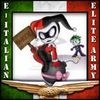
Elected president in July 2008, Mapplna would set a new standard for presidents of Austria in many ways. Proving a very active player, she brought Austria into a more prominent role in the world stage - first joining the Mediterranean Alliance and then its successor, PEACE GC, as a founding member. While previous months saw vast turnover from month to month in the government, by incorporating different players of differing views (and nationalities), a growing sense of national identity was able to be fostered beyond the more fractured community of previous months.
For the first time in Austrian history, an incumbent president was re-elected in August - and then a month later, re-elected again. Serving three consecutive terms, a gold standard was set which future presidents would seek to emulate in the coming years.
While Mapplna proved very popular, this time period was not without its disagreements, with Chicco staking out a position as leader of the opposition, largely over economic issues. Nonetheless, the AIM would have an undeniably dominant role in Austrian politics - at its height containing over 110 members. After three months as president, Mapplna would step aside in favor of her chosen successor, Aanok Tourmil, who would continue her policies. Mapplna herself would, however, leave Austria for Italy after the completion of her final term.
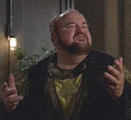
October saw the emergence of a new factor in Austria: Serbian players who awaited the addition of their country. Like Slovenians before them, they looked to Austria as a place to make their mark in the meantime. Remembering the recent past where they represented the untrusted newcomers, Aanok and the AIM looked cooperatively towards the new immigrants and sought common ground in order to strengthen the country. Choosing not to run again, Aanok supported Danny Boodmann T. D. Lemon Nov, also of the AIM, as his successor.
Despite the successes in establishing a far more stable state of affairs - and a more prominent role for Austria - interest began to wane in many members of the AIM, who left for Italy. This was accelerated by the implementation of "Version 1" of eRepublik, which brought many changes to game mechanics. It also marked a final end of the Austrian International Movement. Aanok Tourmil was one of the remaining players of the former party, who sought to turn around the sense of decline. Forming the Austrian Liberal Party out of the AIM's ashes, the month of December saw a push for finalization of the constitution of Austria. But the momentum was not there, and the balance of power shifted once again, this time from the Italian-centered parties towards the Serbian-centered Austrian-Serbian Alliance, which gained even non-Serbian supporters such as Q J Lincoln.
Months of Turmoil (January - March 2009)
See also: Azoo Lazzo, Austrian-Serbian Alliance, Hrvat, Germany-Austria, Chicco, Austria-PEACE Resistance War
Elected president in January 2009 with broad support of his own party and the remaining ALP members, Azoo Lazzo arrival was marked with a hope that this transition would be a smooth one. However, with no activity in the first 10 days, and no ministers appointed, suspicions began to grow to the otherwise. Finally, on January 16th, the first action occurred: a theft of the entire Austrian treasury. Although Azoo initially played it off as a "mistake," the complicated steps required to transfer the large sum of money left a documented trail which was discovered by Hrvat, Q J Lincoln, and other loyalists.
The outcry was immediate, with many members of Azoo's own party taking a harsh stance against his actions. With the creation of Serbia, Austria saw yet another mass exodus, and the economic damage from the theft was compounded further. Through negotiations, a return of most of the stolen funds and all public companies was achieved - but the damage had been done. Dispirited by the massive betrayal, and far reduced in population, some Austrian players began to consider different ways forward.
Chicco revealed his run for the presidency of Austria shortly before the February presidential elections. In his manifesto, he put forward many policies that he believed would rebuild Austria, but most of all he stated that "Austria is not a viable nation." He proposed to combine with another nearby nation for the good of Austria and he promised that, if elected, he would start diplomatic talks with the Presidents of all neighboring nations.This proved to be a highly contentious idea, as some refused to give up on the idea of an independent, sovereign Austria despite the recent setbacks. Nonetheless, Chicco was elected president against Silent Bob, a candidate who favored an even more extreme step of handing over all regions to Hungary immediately. As President, Chicco announced that it had been agreed with Germany to unite both nations as Austria-German Union.
In February 2009, the Austro-German Union was created with the help of, Isy, President of Germany and Chicco, President of Austria. This union began to be implemented, with Germany moving one by one to occupy Austrian regions. Yet the plan was never able to be fully implemented, due to resistance wars established by PEACE GC (Germany being a member of the opposing alliance, ATLANTIS.) A combination of these resistance wars, and Silent Bob's slim victory over Chicco in the March 2009 election (due in large part to many of Chicco's supporters having moved to Germany) spelled an end to the union, yet not the question of whether an independent Austria could succeed. With a virtually non-existent government during the month, and a near total decimation of political leadership, Austria stood at its lowest point thus far. The stage was set for the nations reins to be taken up by a new group of leaders.
Rebirth (April 2009 - February 2010)
Rot Weiss Rot (April 2009 - September 2009)
See also: Metallon, Rot Weiss Rot, Lynari
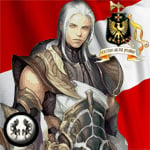
Metallon had been a key figure in working with PEACE GC in the resistance wars, and was a natural choice to lead the small country now. By a unanimous vote of 17-0, he was elected president of Austria in April 2009 from the Rot Weiss Rot (RWR) party, and the government began the job of yet again picking up the pieces. Metallon favored a policy of cautious restoration of regions: with most still being held by Italy, Slovenia, and Hungary, it helped to reduce the open seats available in congress and deter would be-PTOers. The monetary market was put on a slow, but stable path as well, and state companies were constructed after the loss of the previous in the failed union.
After a re-election in May (the first successful re-election since Mapplna nearly a year earlier), he handed his support over to Lynari, also of the RWR, in June. The summer months would see the beginning of World War III - an effort which saw the nations of PEACE GC move into the former nations of the now fallen alliance ATLANTIS. This became a growing issue of contention, as liberal advocates opposed involvement in what they deemed a "war of revenge" on one side, while others in the RWR favored full support of the effort. The Osterreich Independence Party (ÖIP) formed in this environment in opposition to wars of conquest (led by Travis James, containing members of many nationalities bound together by the party's liberal leanings. The Illuminus Austria (IA) would follow suit, forming as advocates of expansion (led by Jazar), and containing largely Brazilian players in Austria.
Lynari would remain a popular figure to both crowds in the growing country, and was re-elected in July, and then in August by wide margins. But as Austria became whole again in the end of September - having grown again into the hundreds of players (of numerous nationalities) - the stage was set for a new confrontation.
The IA vs ÖIP (August - November 2009)
See also: Osterreich Independence Party, Illuminus Austria, Metallon, Rangeley

With Lynari seeking an unprecedented fourth term, Metallon entered the race for a third term of his own, under the Illuminus Austria party. Against a coalition of the RWR and ÖIP, he came out on top and was elected president in September 2009. During this month, Austria increased its role in World War III, and a focus on growing the military and attracting strong international fighters. It would be this month that the ÖIP would emerge from the RWR's shadow, and in the October 2009 election run its own candidate, Rangeley. Organizing a coalition of disparate parties, Rangeley faced off against Metallon, who planned to invade the Czech Republic. Rangeley was elected president.

The cabinet was made to include members from all parties, notably including IA member Dishmcds as Austria's Minister of Finance. However, the month saw several immediate changes, including an end to war planning against the Czech Republic - instead a "shared statement of principles" was signed between the nations vowing peaceful relations. The government strongly rejected expansionism, instead believing that diplomacy with neighbors was essential towards long-term stability. Participation in hostile campaigns within World War III likewise ended, strictly focusing on defensive battles on behalf of allies. These moves strongly angered elements of the Illuminus Austria, who favored expansion, and the month saw continued confrontations between political factions.
The final passage of the Constitution of Austria - a long sought after goal - was achieved early in the month (which notably forbade any formal or legal union with another nation). With a donation-based method of funding implemented for the Austrian Red Cross, the government likewise sought to cut expenses and take a more conservative stance on the monetary markets. In the November race, the IA fielded Querb as their candidate on another expansionist platform. By the narrowest of margins (76 to 75), Rangeley was re-elected president in November.
This would prove a turning point, as soon nations in PEACE GC would begin to leave the alliance, including Brazil (where many members of the IA hailed from, and would return to). Though the ÖIP had been critical of the expansionist policies of PEACE GC, Austria remained in the alliance until the end, (and arguably never left, as no vote was held to do so).
Political Re-alignment (November 2009 - February 2010)
See also: Kronloyale Union (2010), Alfred Ball, National Front Austria, Borojevic von Bonjar
The most significant outcome of these events was a re-alignment of the political alliances, as the pro-expansion movement all but collapsed with the IA falling far in membership. The ÖIP would represent a liberal strain of Austrian politics, while the NFA took on the mantle of a more conservative nationalism; these two forces would define the next few months politically. The December 2010 presidential race saw Rangeley elected to a third consecutive term over the NFA's Alfred Ball and Illuminus Austria's Oraizan. In this month, Austria became heavily involved in defending France against a Spanish invasion. As well, the government placed a major focus on reaching out to German speaking real-life Austrians, offering translations of updates and other outreach programs, with the belief that ultimately this would be the future of the country.
Choosing not to run for a fourth consecutive term, Rangeley stepped aside and the January 2010 election saw the NFA's Alfred Ball face off against the newly formed Kronloyale Union's Borojevic von Bonjar. Alfred Ball succeeded, and the month saw a continuation of involvement in the defense of France, and an emphasis on military involvement. In February, a new coalition formed between the conservative leaning parties of the NFA and KU, facing off against what would previously be an unthinkable alliance of the OIP and IA, who backed Oraizan. Borojevic would be the first real-life Austrian president since frsd was elected exactly 2 years earlier.
War with EDEN (February 2010 - November 2010)
From mid November 2009, through early February 2010, Austria's political sphere saw liberal (OIP, IA) and conservative (NFA, KU) forces face off. Even so, there was broad agreement on foreign affairs: a rejection of expansion, and continued support for the former nations of PEACE GC. In the aftermath of PEACE's collapse, EDEN had regained lost regions and even began to push its advantage. In February 2010, this brought EDEN to Austria's doorstep.
Croatian Invasion (February - March 2010)
See also: First Croatia-Austria War, Borojevic von Bonjar, Oraizan, Hedera
Early in Borojevic von Bonjar's term, he was faced with a major crisis: Croatia demanded passage through the country, en route to attacking France. Refusal would lead to a "permanent occupation" of Austria as punishment. Though Croatian fighters by far outnumbered Austria's, Borojevic refused to betray Austria's allies, and rejected the offer. Croatia launched its war - yet became entangled by a series of military manoeuvres conducted by Austria, Slovenia, and Hungary. Moving roughly half-way through the country, Croatia's advance was halted, and a series of resistance wars liberated the country completely by late February.
Due to time constraints, Borojevic would resign mid-term, to allow Oraizan to continue the time intensive war as president. Throughout the whole effort, a powerful war cabinet was constructed which contained many figures from previous administrations, such as Metallon and Rangeley, who brought every resource to bear against the much more powerful foe. While proving pivotal in the military campaign, it caused some problems politically, as animosities stood in the way of presenting a truly united front in the March 2010 presidential race. Instead, the lack of unity led to the election of a largely unknown candidate - Hedera - powered in large part by multi accounts.
Retreating the entire country to Poland (Croatia's ally) and likewise stealing the treasury, it seemed the previous month's successes had been wiped away in a single move - and likely that Croatia would now succeed in moving through Austria. Yet the previous war cabinet, acting now as a "shadow government" under Oraizan's lead, worked again with allies and accomplished just that - halting passage and removing Poland as well. Hedera would be impeached, and in the March race for president there would be no repeat of disunity: a strong consensus backed stoneman for president.
The Fight for Austria (April - May 2010)
See also: stoneman, Djani Ujkan Marich, Rangeley
stoneman (of the Osterreich Independence Party) began the job of rebuilding the Austrian economy after the damage caused by Hedera, and was aided in part by a respite from the invasions. Penegrin (of the KU) was appointed the Minister of Welfare, in charge of administrating new companies tasked with keeping the economy afloat. But in the congressional races later that month, Croatians PTOers would succeed in gaining a narrow majority, transferring around 400 gold (and equivalent currencies) from the treasury. Worse, gold was donated back into the treasury to be issued as currency, multiplying the PTO's gains.
This setback was a shock, as Austria's congress had never previously been controlled by a PTO. In the May 2010 presidential election, it was needed again the select a candidate to face off against the PTO and deal with a hostile congress. Many favored Djani Ujkan Marich, a player known to have been a member of the Croatian government and advocate of EDEN, who presented himself as repentant, and the only candidate who could deal with the PTO. But this plan would be foiled when Penegrin successfully broke into a secret PTO chat room, in which Djani was present - revealing that he was a part of the PTO all along.
At the last minute, a unity coalition came together around the Osterreich Independence Party's Rangeley, who was elected over Djani for his fourth term as president in May 2010. Believing it important to not focus exclusively on the home front, Austria became heavily involved in the defense of South Korea against EDEN-aligned Japan's invasion in the Japan-South Korea War, believing Austria could make a difference. By month's end, South Korea would push back against the invasion and secure its borders.
The new president also implemented the plan to protect money, with proposals to buy defense systems and hospitals tying up money to prevent donations, and intentionally losing regions to allied nations (who received a percentage of national treasuries). Threats that the PTO would destroy the economy did not stop the anti-theft measures, which ultimately succeeded in securing more money than was lost due to the PTO donating gold to be issued as currency.
Aiding the PTO later in the month was Poland, which launched an attack into Austria (Poland-Austria War). Aiming to wipe the country before the Congress race (forcing open citizenship), their effort fell short due to coordination with Germany, Slovenia, and Hungary. In the aftermath of the defense, Austria even aided in a Slovenian swap into Germany, strengthening the strategic situation. The final setback for the PTO was a mass-banning that included several of their congress members, and many of their supporters. With congress retaken (and easily secured in the May congress race), most remaining PTOers fled by the end of the month.
Taking Charge (June 2010 - August 2010)
With the home front in a more secure position than it had been for months, the broader EDEN-PHOENIX struggle likewise took a turn for the better, with PHOENIX making gains. Rangeley would step aside in the June 2010 presidential race, which turned into a conflict between Adeptus Astartes' Fragreg and the Conservative Party's Kaiser Alex. Although already the frontrunner, Fragreg solidified his lead after a dirty campaign by Kaiser Alex focused on Fragreg's nationality backfired. Having established his trustworthiness, Fragreg soundly defeated Kaiser Alex with the backing of most parties.
June saw Austria again on the world stage, this time enabling a major swap with PHOENIX nations that would lead to Spain being finally removed from France in the battle of the Rhone Alps. The success combined with highly competent economic leadership in moving Austria further down the road to recovery. The Kronloyale Union's Penegrin would follow Fragreg, who did not run for re-election, and was elected in a landslide in July.
This month would see the implementation of a new military module, which favored combatants who were highly organized - ultimately increasing Austria's effectiveness and downplaying its numerical disadvantage. Austria would increase its participation in battles around the world, with a special focus being played on other small nations. With Penegrin stepping aside after one term, the Osterreich Independence Party's Thomas765 would run unopposed in the August 2010 election.
Italian Invasion (August - November 2010)
See also: Italy-Austria War, Thomas765, Kikericsy, Penegrin, Travis James, Alfagrem
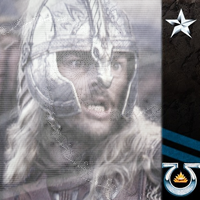
Peace on the home-front would be broken, when Italy launched an invasion of Austria in August. Although Austria was strongly overmatched in terms of numbers, through organization (particularly with Fragreg's leadership in military affairs) and diplomacy Italy was repelled in two successive battles. President Thomas765 worked with Minister of Foreign Affairs Rangeley in a diplomatic push to end the conflict with Italy, offering forgiveness based on the historic friendship between the countries. For a time, it would prove successful.
Thomas765 did not run for re-election - instead, Kikericsy faced off against samu-L in what amounted to a referendum on whether to join PHOENIX. Kikericsy would easily win the race, and later in the month an official vote was held to join the alliance. While the vote in Austria would be in the affirmative (by an over two thirds margin), PHOENIX would reject the proposal. The tide had begun to turn against them again, and some member nations did not want to accept new smaller nations. The rejection emboldened Italy, which launched again an invasion and found increased success as yet another military module had been implemented, which favored raw numbers.
Penegrin would be elected by a wide margin as president in the October 2010 race, coordinating heavily with Germany and other regional PHOENIX allies. A focus was retained on maintaining state-run companies in order to further economic growth. But ground continued to be lost, and even Germany began losing regions to Italy. With the creation of several new nations, Austria would see a small exodus as some players departed. A weakened electorate saw small participation in the November 2010 race between the Osterreich Independence Party's Travis James, and Socialist Party's NIKAN. NIKAN would win by a slim margin, and would turn out to be an agent of EDEN yet again - stealing the entire treasury and aiding further the Italian invasion, before being impeached.
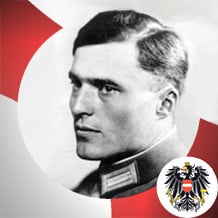
Travis James would succeed him as president, bringing together a new team of players, including JaFe as Minister of Finance, to handle the new crisis - which had not ended. With EDEN hoping to wipe Austria from the map for the November congress race (leading to open citizenship), the fate of Austria hung in the balance. Rallying fighters together, efforts to stop the Italian advance proved ineffective. Early on the 23rd of November, Austria had been entirely wiped off the map. Austria would need to return to the map before the end of the day - and it all depended on a successful resistance war in Vorarlberg. In what became known simply as "The Battle of Vorarlberg," Alfagrem, a powerful fighter from South Korea answered the call and looked to return the favor for Austrian help against Japan earlier in the year. Delivering massive amounts of damage, he almost single handedly took on the powerful Italian military. Austria returned to the map, and players quickly founded the Austrian Unity party, successfully securing Congress and preventing open citizenship.
After this surprising victory, there was a true sense that Austria had been granted a new chance at life, and a new opportunity. Italy would eventually be pushed entirely from Austria. This drew to a close the direct war with EDEN, as Austria entered a new era, uncertain of what was to come.
A Republic Expands (December 2010 - February 2012
Moving past the long war with EDEN, Austria now had one party: the Austrian Unity. This "unity," however, would be an imperfect one: a number of old divisions remained. Although led ostensibly by liberal elements, with Rangeley as party president, the nationalist-leaning PrinceOfAustria, a long time Minister of Defense, was selected as the presidential candidate in December, in order to present a broad front.
A Cold War Flares (December 2010 - January 2011)
See also: Austrian Unity, PrinceOfAustria
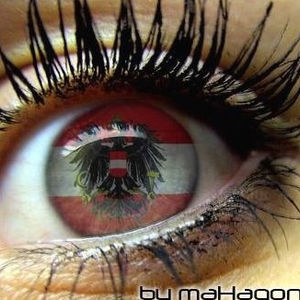
Continuing the trend of the last days of Travis James presidency, more regions would be successfully returned from Italy. One region that remained occupied, however, was Upper Austria - held by Slovakia. Slovakia had moved into Lower, and Upper Austria in October in a largely uncontested battle, in the midst of the larger Italian invasion. Unable to fight in two fronts, and with the Slovakian front largely laying dormant, this war remained a cold one. However, with Italy now on the retreat, Slovakia saw an opportunity to expand its footprint, moving to attack Styria in late December. President PrinceOfAustria rallied broad support, and with a clean victory, Austria won the Battle of Styria.
The question was then what the next move should be: with Upper Austria still held, and after a string of victories, the government believed a battle in Upper Austria would be very winnable. PrinceOfAustria opened the attack: however, while Slovakians were divided about attacking Styria, they were united in opinion on holding Upper Austria: the battle was a decisive loss. This setback led to a reshuffling of the cabinet in January 2011, when PrinceOfAustria was elected to a second term by a wide margin. Integrating more players from previous administrations (particularly members of Travis James's administration). This new team saw Vreath as Vice President, JaFe return as Minister of Finance, Rangeley return as Minister of Foreign Affairs, and Klavh as Minister of Defense.
With a new resource system implemented, the government negotiated deals with Slovenia, Hungary, and Serbia to rent regions for gold. This became possible after an amendment to the Constitution of Austria which outlined the official process for legally renting regions for extended periods of time. Slovakia would remain the sole holdout: refusing to make rental payments, their occupation of Austrian regions remained unrecognized by the Austrian government. Tensions again flared in the middle of January: Slovakia announced a "training war" was taking place with Austria. Although Slovakia promised to return any regions taken, the timing would complicate rental plans with other nations - and the lack of communication or consent led Austria to reject the idea that this was a mere "training war." Rallying support of allies again, the hard fought battle ended in a victory for Austria.
An opportunity to turn the page presented itself later in the month: Hungary desired Bratislava, a Slovakian region, for rent. As Austrian help was essential for a swap to take place, the government sought to use this as an opportunity for a broad regional agreement, including the Slovakian occupation of Austrian regions. But Slovakia refused to consider discussion on any topic other than Bratislava, and walked out of the talks. The setback would end hopes in January of addressing the longstanding issues.
January saw an increased international role for the Osterreichs Bundesheer. With Bulgaria leaving PHOENIX and attacking its former ally, Turkey, Austria sent fighters to defend Turkey from the invasion. In another foreign deployment, Austria became involved in settling the dispute in the Malaysia-Singapore War. With Singapore at risk of being wiped for Congress, Austria supported them in a battle against a hostile invasion. But when Singapore in return sought to then wipe Malaysia in revenge, Austria fought to defend Malaysia. Acting as an arbiter, "Operation: Everybody Lives" was implemented with the agreement between the two parties, successfully avoiding a wipe for either nation through the election.
Cold War Continues
See also: Gute Nachbar-Doktrin, JaFe, Vreath, Albert Neurath
While unable to solve the issues with Slovakia, tensions would subside for a time. In February, with PrinceOfAustria stepping aside, the Austrian Unity party would endorse JaFe for president. Taking a more liberal tact than his predecessor, a focus continued on settling the issue of Slovakian occupation of Austrian regions. Likewise, a strong focus on rebuilding the treasury continued. JaFe had served as Minister of Finance during most of the time since the theft in November, and had selected a trusted advisor of his, Jules Casey, as his MoF during his presidency. By February, despite the ongoing territorial issues, Austria's economy had stabilized, and the rental program with Slovenia, Hungary, and Serbia continued to be a success. Their presence also would serve as a roadblock to any realistic expansion by Slovakia into further Austrian regions.
Austria would be a key participant in the 2011 eRepublik Rebellion, a widely supported movement against certain changes in the game, with President JaFe as an early signatory. Joining in a worldwide peace treaty, for a brief moment, all conflicts in the New World ceased. JaFe's Minister of Foreign Affairs, Rangeley, was selected as one of four spokespersons to negotiate with the eRepublik administration. The negotiations, however, failed to lead to changes, and after the implementation of new missions, the worldwide boycott against war slowly collapsed. Nonetheless, participation in the effort increased relations with Hungary and Slovenia, strong supporters of the effort.
After one term, JaFe would step aside. The Austrian Unity, no longer the only party in Austria (joined by the Szekler's PHP and Socialist Party), was renamed to the Osterreich Independence Party after a vote by party members and a payment of ![]() 40 GOLD to the Austrian Government. All three parties would back Vreath, who had served as Vice President during PrinceOfAustria and JaFe's administrations. Vreath's term would see the formulation the Gute Nachbar-Doktrin, a policy which respects the sovereignty of all neighboring nation and asks for the same from neighbors in return. In practical purposes, it ruled out aggressive expansion in a formal doctrine - yet laid the groundwork for how the expansion could occur: with bilateral agreements with neighbors.
40 GOLD to the Austrian Government. All three parties would back Vreath, who had served as Vice President during PrinceOfAustria and JaFe's administrations. Vreath's term would see the formulation the Gute Nachbar-Doktrin, a policy which respects the sovereignty of all neighboring nation and asks for the same from neighbors in return. In practical purposes, it ruled out aggressive expansion in a formal doctrine - yet laid the groundwork for how the expansion could occur: with bilateral agreements with neighbors.
Tensions would continue with Slovakia, but the month saw no new battles erupt. Instead, a training war was arranged with Switzerland. The move, however, saw interference from opponents of Switzerland, who looked to use the war as an opportunity to wipe Switzerland. Unwilling to allow the training war to be hijacked, President Vreath organized fighters to fight on behalf of Switzerland. After a week, the war was able to be closed. Although it would prove costlier than intended, Austria would keep its word and overcame efforts to abuse the training war.
Austria would also aid its ally Slovenia against a resurgent Croatia. With Croatia looking to wipe Slovenia from the map for the March Congressional race, a key resistance war battle in Carinthia (which returned the region to Austria) halted Croatia's advance into the other rented regions, and protected Slovenia from open citizenship. This further strengthened Austria's longstanding friendship with Slovenia, a relationship which would prove essential in times to come.
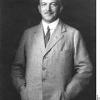
After one term, Vreath would step aside as President. Albert Neurath, party president of the conservative Austrian Coalition of Patriots, ran in his stead and received the endorsement of the OIP, Socialist Party, and PHP. Implementing a re-organization of the Austrian government, based around a corporate model of directorates, Albert Neurath looked to take changes abroad as well. Making definitive moves towards the newly formed Order of New EWorld (ONE) alliance, he saw a way to settle issues with Slovakia.
By aligning closely with Hungary and Slovenia, this could raise pressure and achieve a new agreement. With strong relationships with Hungarian president mobra and Slovenian president Blaz Gutman, a roadblock was met with Poland's strong support of Slovakia. Although Albert Neurath preferred no regions be occupied at all, an agreement was reached known as the "Central European Friendship Pact", establishing the legal framework for the rental of region in exchange for gold. By the end of the month, half of the agreement was achieved, with Burgenland held by Slovakia, and plans were in the works for a transfer of Styria as well.
War Erupts (May 2011 - July 2011)
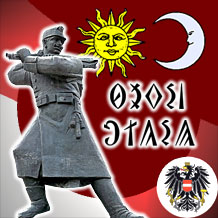
Succeeding Albert Neurath as president in the April 2011 election was AliasSun, an influential political figure and leader of the PHP - the powerful Szekler party in Austria. With his strong ties in Hungary, there was a hope to build on the progress made during the past months and secure the terms of the CEFP. But this would be dealt an immediate setback: Hungary would see the election of a new president who was less interested in Austria - and Slovakia would see the election of a new hardliner who rejected the terms of the CEFP, and desired full conquest of Austria. In this difficult situation, and with no alternatives presented, President AliasSun decided to face the invasion head on, hoping to drain Slovakian resources. After a series of extremely hard fought battles, Austria was wiped from the map, and for the first time, wiped during a congress election. Though this no longer meant there would be open citizenship (due to a game change,) it was nonetheless a dire situation. With Slovenia the only nation in Austria's corner, it was more isolated than it had been in years.
Although an extremely difficult month, the heroic efforts of the Szeklers - both in Austria and in Hungary - would endear Austrians to them and remove any doubts about their loyalty to Austria. By going to bat for Austria, they and Slovenia laid the groundwork for a path forward. After one term, AliasSun would step aside, and the Osterreich Independence Party endorsed Rangeley for president. As the diplomat tasked with working with Slovakia during the past 5 months, he hoped to finally achieve a breakthrough. Reiterating that both Slovakia and Austria were pro-ONE - and that continued fighting was nothing but a distraction for the larger ONE cause, the new president insisted that more could be accomplished together than from continued fighting. Rather than dedicating resources to fighting Slovakia, the Osterreichs Bundesheer fought hard for Hungary and Slovenia.

This strategy proved controversial in Austria - with many, frustrated after months of conflict, wanting continued war with Slovakia. In Slovakia, the reception was likewise mixed at first. Yet Slovakian President fwdre, and his Minister of Foreign Affairs, Dimitru Osraldescu, were interested in turning the page in relations, as even without active effort from the Austrian government, the task of holding Austrian regions against medal hunters proved costly. By the middle of the month, an agreement was reached between Austria, Slovakia, and Hungary, which would rent several regions to Hungary, and lead Slovakia to peacefully return the rest. Resistance wars supported by the three parties succeeded, enabling the election of a new congress.
Rangeley was re-elected president in July, and work continued with the new president of Slovakia - Dimitru Osraldescu, who stated he hoped to draw a firm dividing line between the past hostilities, and new friendship. This was put into immediate action, as Croatia (led by Croatian president Djani Ujkan Marich) launched an invasion of Austria and Slovakia, bringing the nations together in battle as allies. By the end of July, Austria and Slovakia were firm allies - and the long war was but a memory.
Peace and Prosperity (August 2011 - February 2012)
See also: erdoni, Luis Grindl, csaba.pinter, patar333
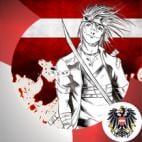
After two terms, Rangeley was followed by the Osterreich Independence Party's erdoni in August 2011. An accomplished economist, and military fighter, he led the Osterreichs Bundesheer during the previous two months. As president he continued the war effort against Croatia, working especially close with Slovakia, building personal friendships between the armed forces of the nations in a way that had not been done previously. Croatia would be finally expelled from the country, and with the end of this fight, Austria entered a new period of extended peace - one that it had not seen since before the war with EDEN began in February 2010. All original Austrian regions were held by Austria.
A new training war was held with Poland, emphasizing the new role Austria had in the region, which was surrounded by friendly nations largely in the ONE alliance. After one term, erdoni stepped aside. The September election saw the most competitive election in many months, with patar333 facing off against Luis Grindl. Luis Grindl was elected with 51.81% of the vote, and would work to build upon the new peace: bringing Austria beyond its borders.

Luis Grindl worked with Slovakian president gabberattack to create a new rental arrangement. As Slovakia had peacefully merged with the Czech Republic for a time, they had surplus iron resources in the region of Southern Bohemia. In exchange for renting this region to Austria, the regions of Styria and Burgenland would be rented to Slovakia. This agreement, known as the "Styria-Southern Bohemia Treaty," drew broad support, and was signed into law late in the month. After one term, Luis Grindl did not seek re-election. In the October 2011 race, economist csaba.pinter would face off against former president JaFe. In another close race, csaba.pinter won with 55.32%.
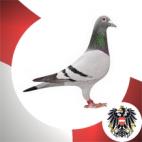
csaba.pinter's term saw the implementation of the Styria-Southern Bohemia Treaty. In a clean battle, Austria occupied Southern Bohemia. This agreement would hold, with little to no incidents, for the next 4 months, as Austrians enjoyed the largest region bonuses they had ever enjoyed before - and for the first time held regions outside of Austria for an extended period. In the November 2011 presidential race, patar333 would run again, this time with the support of all major parties.
The month of November saw a successful administration of the treaty, and further cooperation with allies. But the competitive political environment continued, as he saw a strong challenge from former president erdoni in the December 2011 race. Ultimately, erdoni would win the election, with 53.6%. December again saw success and peace, with a focus placed on helping allies abroad. Considering the place Austria had stood a year prior - on the brink of destruction - there had been a remarkable turnaround to one of the highest points in the nations history. The opportunity afforded by the victory in Vorarlberg had been seized.
War At Home (February 2012 - August 2012)
Takeover and Impeachment (February 2012)
See also: A.Emmerich, Vreath, AliasSun
The long period of peace and prosperity would end not with invasion, but with a betrayal reminiscent of Azoo Lazzo's three years prior. With an Austrian population eager to help newer citizens climb the ladder, A.Emmerich, who was elected president in January, largely continued policies of the previous governments. Although Hungarian in origin, this was a non-issue, as many other Hungarians and other foreigners worked side by side together. With continued success for the country, he was re-elected in February. In February however, he would declare that he was "emperor" of Austria, launch resistance wars against Slovakia (breaking the Styria-Southern Bohemia Treaty), and pledge to give Burgenland away permanently to Hungary. He also announced that the Kuruc MU, which already had some members, would be immigrated in its entirety for the purpose of taking full control of the country.
The actions would have immediate consequences, as the cabinet took charge, looking to undo the diplomatic damage. Along with a swift congressional impeachment of the self proclaimed "emperor," issues over Burgenland were solved with Hungary (as regions could not simply be given away in that manner). Meanwhile, more of the Kuruc military unit would enter into Austria, initially supportive of the ex-presidents mission. In order to bring this to a halt, the new president, Vreath, authorized a plan to intentionally have Austria wiped for congress. This plan proved key in halting the growth and momentum of the PTO, as no citizenship requests could be granted. However, in the aftermath of the PTO, Southern Bohemia would not be retaken from Austria. Along with the events in the nation, external pressure on ONE made the effort impractical in the short term.
Countermeasures (March - May 2012)
See also: AliasSun, OEBernd, Vreath
While A.Emmerich had been impeached, he vowed to make a return to power. With a sizable number of supporters imported, even despite the Congress wipe, it was clear that Austria was not free of danger. To present a broad front in the presidential race, AliasSun ran for president in March 2012, with the backing of every party except for the National Front - A.Emmerich's party. In a key test of support, AliasSun would win with 68.48% of the vote.
He would continue efforts in the aftermath of the PTO, especially working with Hungary to exert pressure against the PTO effort. Military cooperation continued with ONE in battles abroad. During this time period, the media was filled with many dueling articles from both sides. After one month without a congress, the election proceeded in April: 82.50% of the seats were secured by the anti-PTO coalition. This enabled both sides to use citizenship approvals to bring in supporters. OEBernd would run for president in April as the unity candidate, this time winning with 69.53% of the vote. With A.Emmerich now banned for multis, the leadership of the National Front moved to its new party president, Tarsolytestver, who largely would continue the hardline, pro-PTO stance. While the PTO continued to grow in strength during this time frame, Congress remained securely held, with the coalition holding again 79.42% of the seats. However, the number of votes possessed by the PTO continued to grow.
In May, Vreath would win the presidential election with 62.5% of the vote. Re-implementing the congress wipe plan, no congress election took place during this month.
Reconciliation (June - August 2012)
See also: Rangeley, II. Jemby, Prince of Austria, ZoltanB

With tensions remaining at a high level between the factions, there were growing signs that some in the National Front wanted to move beyond the past few months. Amongst those on the Austrian side, this sentiment began to grow as well. AliasSun in particular had worked hard to find Kurucs who were willing to work together with Austrians, using his ties to Hungary and Hungarian politics. With Rangeley's election to the presidency in June, a supporter of reconciliation, Kurucs were for the first time included into the cabinet - particularly II. Jemby.[4] While there would not be universal agreement on issues, there would be common ground that could be built upon, and friendships formed.
Along with reconciliation efforts, the month would see the "Reorganisationsplan" implemented in the Osterreichs Bundesheer, to better take advantage of changes to the military module.[5] This new module would see an early test: the continued deterioration of ONE's position led Romania and Croatia to launch an invasion of Austria, after moving through Slovenia. Despite support from ONE's central command, Austria would be wiped by the end of the month. The war would, however, prove a point where all sides could cooperate.[6]
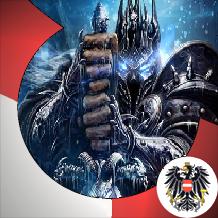
Prince of Austria would succeed Rangeley as president in July (with 62.24% of the vote), after serving as vice president the previous month. This began three consecutive terms as president: the first such stretch since 2009. The new cabinet would include II. Jemby again, then the party president of the National Front.[7] The war effort against Croatia continued in earnest: setbacks continued in the first half of the month, as Croatia remained in a dominant position, successfully holding off several attempts at resistance wars. Yet persistence would pay off, as Austria returned to the map late in the month with one region by August 5th. In his successful re-election campaign, Prince of Austria included ZoltanB as his vice president, an influential member of the National Front.[8]
Re-elected to a second term with 62.28% of the vote in August, broad changes began to occur in world geopolitics, as ONE came to a formal end as an alliance, after months of struggles. Even so, the progress in liberating regions continued, and by the end of the month, all regions were returned into friendly hands - and Austria made it clear the end of ONE would not mean the end of cooperation with its allies, any more than previous ends to alliances meant this.[9] In his third term, this cooperation would continue. Changes came to the home front as well - after the departure of the highly influential AliasSun, lazo succeeded him as party president of the PHP.
A New Consensus (September 2012 - August 2013)
Although there would not be a total agreement, there would be a common consensus around which all major parties could work. This was embodied in some ways by the increased role that the PHP took, under the new leadership of lazo.
Growing Cooperation (September 2012 - March 2013)
See also: Prince of Austria, lazo, OEBernd
War With Latvia (April - June 2013)
See also: Schwrzwolf, Rangeley
Coalition Government (July 2013 - October 2014)
A New Leadership (July 2013 - February 2014 )
See also: Harzakc, yst31, Schwrzwolf, LarsUlrich87, OEBernd, Prince of Austria
In the aftermath of the Latvian war, Austria saw shifts in the political dynamics of the country. During Harzakc's term as president, the Szeklers began to leave Austria, with many returning to Hungary. The Szeklers had formed one of the largest political faction since the summer of 2010, forming successful political alliances with governments throughout this time. Their departure in late summer 2013 brought a new sense of uncertainty. But Austria was in a different place 3 years after their entry: with real life Austrians more numerous, and now even the undisputed majority of the country, new leaders rose to the occasion.
A new challenge facing the country would involve abuse of the immigration system by the "tiegers" PTO group. While they had begun to move into the country late in 2012, they would rise to more prominence during the summer of 2013. With the Szeklers much smaller, and with the tiegers having imported many voters of their own, action had to be taken. After his election in August 2013, yst31's presidency was marked with the introduction of Congress wipes as a method of curbing their growth. By purposely having no regions for the congress election, there would be no citizenship approvals for the month.
Cooperation would continue with Slovenia and Slovakia, in the form of military assistance and training wars, as well as in carrying out the Congress plan. yst31 would also begin the process of updating the Constitution of Austria to better reflect the current game. After serving two terms, yst31 was followed by Schwrzwolf as president in October. An agreement was reached between the government and the tiegers, where citizenship approvals would only be used with a consensus between the parties. This led to the first congressional election since July. With a congress in place, the amendments to the Constitution could be placed to a vote (congressional approval was required.) The final approval was given in November, with LarsUlrich87 as president.
However, the agreement with the tiegers was broken when the tiegers approved many new citizenship requests. This prompted LarsUlrich87 to re-institute the Congress plan.
Primary System (March 2014 - October 2014)
See also: Prince of Austria, capoqwer, Jeanlouis, Vlado33, Geheimdokument, Cyberkoc
In order to foster more political competition, a primary system was introduced.
Recent History (November 2014 - present)
Increased Party Role (November 2014 - January 2015)
See also: wschwabe, Geheimdokument
Preventive Coup (February - June 2015)
See also: Schwrzwolf, capoqwer, sinisa91, wolfwien
End of 2015 (July 2015 - December 2015)
See also: Harzakc, Prince of Austria, Luis Grindl
 Wars
Wars
List of wars that Austria is taking part in or took part in:
- Austria-PEACE Resistance War (March 27th, 2009 - April 12th, 2009)
- World War III (July 13th, 2009 - November 16th, 2009)
- Indonesia-Malaysia War (November 10th, 2009 - ?)
- Hungary-Austria War (November 18th, 2009 - November 21st, 2009)
- Spain-France War (December 3rd, 2009 - February 6th, 2010)
- Battle of Kyushu (December 7th, 2009 - December 8th, 2009)
- First Croatia-Austria War (February 11th, 2010 - February 23rd, 2010)
- Second Croatia-Austria War (March 13th, 2010 - April 3rd, 2010)
- Second Japan-South Korea War (May 6th, 2010 - May 25th, 2010)
- Poland-Austria War (May 20th, 2010 - May 31st 2010)
References
- ↑ "The Country Power" - Austria Democrat News
- ↑ "Uvodnik" Salzburske Novice
- ↑ "Kurčeva kraja ali kaj za kurca?" - Salzburske Novice
- ↑ June 2012 Cabinet
- ↑ Reorganisationsplan
- ↑ "Laying Groundwork" - Austrian Independent
- ↑ July 2012 Cabinet
- ↑ Prince of Austria's August 2012 campaign article
- ↑ Prince of Austria's September 2012 campaign article
